TRYING TO SQUARE CIRCLES













In the second half of 2022, the Czech Republic is holding the rotating Presidency of the Council of the European Union. On this occasion, Diplomacy&Trade carries an extensive interview with the Czech Ambassador to Hungary, Tibor Bial who presents in detail the priorities of the Presidency in addition to highlighting Czech-Hungarian cooperation in various international platforms and also explains how his country has been preparing for the likely challenges of the coming winter.
“My main occupation is being a medical doctor, which I enjoy doing and which actually relaxes me and gives me pleasure every minute.” That is the credo of Dr. Béla Merkely, a Hungarian interventional cardiologist and sports cardiologist, a university professor, director of Semmelweis University's Heart and Vascular Center as well as the rector of the Semmelweis University. see article on pages 06-07


With the election of Rishi Sunak as Prime Minister, the British government calamity seems to be over – for the moment. However, other problems have remained and the new PM has already warned of ’difficult’ decisions to deal with the ’profound economic crisis facing Britain’. And if that is not enough, further challenges include unresolved post-Brexit questions with the EU, Scottish independence attempts, the future of Northern Ireland and the security and energy implications of the Russian war in Ukraine, just to name a few. All in all, as our analyst suggests, Rishi Sunak is facing the daunting task of trying to square circles. The Czech Republic holds the Presidency of the Council of the European Union in the second half of 2022. Diplomacy&Trade presents a special Focus on Czech-Hungarian bilateral relations in cooperation with the Czech Embassy in Budapest featuring an extensive interview with Ambassador Tibor Bial. The main issues tackled by the Czech Presidency have been inspired by former Czech President Václav Havel's 1996 speech in which he called on Europeans to take responsibility for global environmental, social and economic challenges. Thus, the most important issue of the Presidency is managing the refugee crisis and Ukraine's post-war recovery, followed by energy issues and the strategic resilience of the European economy. The Ambassador discusses the nicely developing bilateral economic relations as well. The Focus also presents the export promotion agency CzechTrade and the Czech-Hungarian Business Council. Of course, the representatives of the Czech corporate presence from bathroom furnishing to the nuclear industry in this country are included as well.
Featured in this edition’s ‘Executive World’ is Hungarian interventional and sports cardiologist, university professor and director of Semmelweis University's Heart and Vascular Center, Dr. Béla Merkely. He talks about how much a vocation and a passion his beloved profession is.
In Hungary, the Continental Group is present in three business sectors, such as the automotive sector, tires and through ContiTech, a supplier of industrial solutions. As you can read on our business page, they all work towards achieving safety on the roads by shaping sustainable mobility.
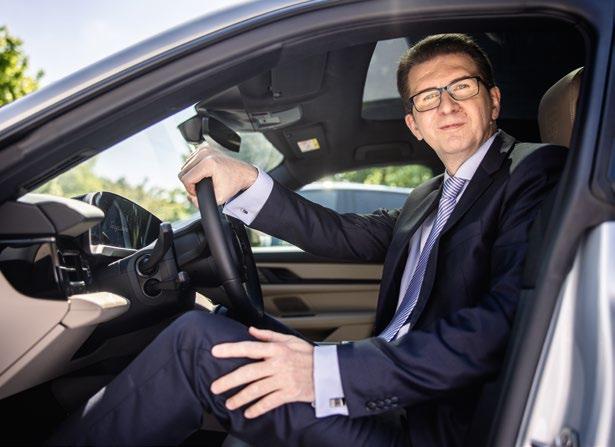
WittyLeaks is authored by the Chilean Ambassador who tells the stories of several Hungarian painters who emigrated to the South American country in the 20th century and became very influential members of the artistic scene and society there.
Our gastronomy page features the new Executive Chef of the Kempinski Hotel Corvinus Budapest who returned to Hungary after gaining longs years of international experience. Another downtown hotel, the Matild Palace revives the early 20th century Pest nightlife with Matild Café & Cabaret presenting live performances of Hungarian and international entertainers.
As we move from fall to winter, the economic difficulties of individuals and companies alike are becoming more evident. Energy and food prices are sky high with no relief in sight. What to do? No easy answers…
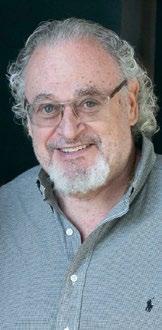
 Peter Freed PUBLISHER
Peter Freed PUBLISHER
05 ON THE RECORD 06-07 COMPANY BRIEFS 08-09 EXECUTIVE WORLD Dr. Béla Merkely, the rector of Semmelweis University 10-20 CZECH FOCUS Interview with Ambassador Tibor Bial; CzechTrade; Yettel; Czech-Hungarian Business Club; ŠKODA JS; ŠKODA vehicles; RAVAK 22 BUSINESS Continental Group 24 ANALYSIS Challenges for the new British Prime Minister


GASTRONOMY
Executive Chef at the Kempinski Hotel Corvinus Budapest
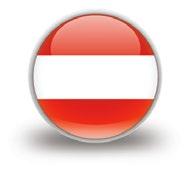

Hungarian consumers believe it is important that their household appliances are energy efficient, and the majority are willing to pay a premium for appliances with a better energy rating, but many are not aware of the meaning of energy labels, according to a recent survey by Euronics, a chain of technical stores.
The survey says nearly half of respondents would choose an energy efficient appliance if it met the criteria that were most important to them, and almost half (42%) said that it was an essential aspect for them. Only 12% said that energy saving had little or no influence on their decision.
Respondents ranked energy efficiency as a top priority for refrigerators (83%), washing machines (74%), freezers (67%) and boilers (63%), while it was least important for televisions (42%) and microwave ovens (37%).
The majority of respondents were also prepared to pay a premium to have an appliance that uses less energy. 43% are willing to pay 5-7% more, a quarter of them 8-10% more and 8% even 10-20% more. However, about a quarter of those surveyed are reluctant to do so.
record of 817,300 units by a few percentage points year-on-year.
The decline is also confirmed by quarterly totals, with 217,000 changes of ownership recorded in the first three months, followed by 211,000 and 208,000 between the beginning of July and the end of September, they added.
However, they pointed out that the weakening of the Hungarian currency, the forint against the euro and the tightening of supply in Western Europe are making imports even tighter. In August and September, imports fell short of 10,000 units, although the annual total of vehicles imported from abroad rose from 98,000 to 99,300 by the end of September.

Compared to a year before, domestic sales of used cars declined in Hungary in September 2022, but have been increasing since the beginning of the year compared to the same period last year, joautok.hu [‘Good Cars’] told the state news agency MTI.
According to Datahouse, 68,586 used cars were sold in Hungary this September, compared to 72,183 a year ago. Before that, only in July did the market fail to reach last year's level, so sales in the first nine months of the year rose from 612,100 to 636,400 year-on-year. During this period, 76% of the vehicles were at least ten years old, and 51% were lower-middle-range or small cars, they said.
As joautok.hu stated, the deteriorating economic situation is reducing demand, but the first half of the year was still good, so the domestic market for used cars could surpass last year's
The Budapest Festival Orchestra (BFO) has been voted Orchestra of the Year, according to an announcement at the Gramophone Awards gala event in London early October.

Iván Fischer's ensemble competed with the Vienna Philharmonic Orchestra and the Bavarian State Orchestra, among others, in the competition of the world's most prestigious classical music magazine and received more than a third of the votes.
The BFO was nominated by a jury of experts as one of the ten best based on its Brahms recording of the previous year, from which the international audience could choose its favorite.
The prize was presented to BFO Managing Director Orsolya Erdődy, and Chairman of the Board of Trustees, András Simor at a ceremony in the British capital.
The Budapest-based orchestra was certainly not only voted for by the Hungarian public, as they have a large fan base in Germany, the United Kingdom and the United States, among other countries, thanks to their constant touring and record releases.


Overall, Budapest and the western part of the country offer better opportunities in education, culture, shopping and the labor market, while in Eastern Hungary, it is easier to get a home, according to a survey, conducted by Takarék Jelzálogbank [‘Savings Mortgage Bank’] on education, healthcare, culture, crime, the labor market, shopping opportunities and housing affordability.
The experts have compiled a ranking of the comparative livability of the county's county seats, which is again topped by the capital. Here too, the gap in scores between Budapest (100 points) and the other cities is relatively strong. Veszprém came second with 78.9 points and Győr third with 68.9. Debrecen, in fourth place with 60.4 points, was 12th last year. The top ten also includes Székesfehérvár (60.3 points), Szekszárd (59.9), Pécs (58.9), Szombathely (58.4), Zalaegerszeg (57.2) and Kaposvár (55.3). At the bottom of the list are Kecskemét, Salgótarján and Békéscsaba, with less than half the points of Budapest: 42.1, 41.6 and 39.2 points respectively.
Kossuth Prize-winning pianist, composer, national artist and outstanding figure of Hungarian jazz, Béla Szakcsi Lakatos, passed away in early October at the age of 79. Born on July 8, 1943 in Budapest, he started playing the piano at the age of nine, only then did his family have enough money to buy him an instrument. He was introduced to jazz as a student at the Béla Bartók Music School and his interest turned to improvisation, a more informal genre.
In 1970, he was a member of Aladár Pege's double bass quartet, which won second prize at the Montreux Jazz Festival. He worked for six months in a Hungarian restaurant in New York, went to jazz clubs in his spare time and returned home with a cheap Fender piano. He was the first to use this instrument in Hungary. In the 1970s and ‘80s, he made an unparalleled contribution to the rise of fusion jazz in Hungary. He taught jazz piano at the Béla Bartók Secondary School of Music and gave a master class at the Liszt Academy.
Like his idol, Leonard Bernstein, he was also a highly versatile musician, having played in ensembles and solo, composed his own music and jazz standards, performed classical concertos with large orchestras, with young jazz talents and with the 100-member Gypsy Orchestra alike.
German-owned Infineon Technologies celebrated the expansion of its plant in Cegléd, SE of Budapest early October. It is Hungary’s largest semi-conductor manufacturing facility. The EUR 100 million investment, that is to create up to 275 jobs, allows for the production of high-power semiconductor modules that will be built into the inverters of electric and hybrid vehicles. One fifth of the investment will be borne by Hungarian taxpayers. Munich-based Infineon Technologies AG is the global market leader for automotive semiconductors. Thanks to its large-scale operation, almost every second electric or hybrid car produced in 2021 uses Infineon semiconductors in the inverter. The German company is present in 140 countries worldwide,
This year sees a major milestone in the history of Kempinski Hotels as the company celebrates its 125th birthday, while Kempinski Hotel Corvinus Budapest marked its 30th anniversary this fall. This anniversary represents an important jubilee for the hotel, following three decades of precious moments, memories and experiences in the art of hospitality, according to a press release.
The first purpose-built joint-venture five-star hotel in Budapest after the change of the political system welcomed its first guests on September 11, 1992. Its pioneering spirit, combined with Kempinski’s trademark European flair, has consistently positioned the hotel at the forefront of the city’s competitive market, and as a market-first innovator.
The press release adds that Kempinski Hotel Corvinus Budapest is well known for its unique, professionally curated Corvinus Art Collection, which also appears in the recently published 'Storytelling Suites'. The hotel invited five leading Hungarian writers to spend a night in the Art Collection Suites and write a short story inspired by the suites and the works of art there. The resulting booklet is not only testament to the hotel’s continued dynamic commitment to the local art scene but will
also allow guests and partners to relate to and appreciate the fabric of Budapest and Kempinski Corvinus’ part in it in a rare, inspired and enriching way. The luxurious property’s management is proud that ten of its employees have been working at the hotel since the opening. The management and the board members of the hotel honored the dedication of these long-service staff members on September 29 with a festive lunch. Their loyalty was acknowledged with a travel pass redeemable at one of the European Kempinski hotels, including travel costs.

As the General Manager of the hotel, Stephan Interthal highlighted, “I have managed this wonderful hotel for 15 years out of the past 30 years of its operation. Budapest, which is my second home by now, became a cosmopolitan metropolis before my eyes. In 1997, when I arrived for the first time, the city was very different, and today, Budapest surpasses several famous capitals in many aspects. I would like to thank all those who have accompanied and supported us over the years: our owners, Kempinski Hotels, partners, guests, colleagues and friends.”
employing more than 40,000 people. Infineon has been operating in Hungary for over 25 years. The semiconductors produced by Infineon’s Hungarian subsidiaries are used in industrial automation and power technology, medical equipment, energy production, transportation and distribution, and also in the field of renewable energy sources.
The inauguration follows almost exactly three years after the foundation stone was laid. The new production capacity is set to fulfil demand for high-power modules that help the electrification of vehicles and enable green energy for wind turbines, solar modules and energy-efficient drives.
As Infineon COO Rutger Wijburg pointed out, the new manufacturing capacities will help Infineon to accommodate the growing demand for electromobility applications with a clear focus on Europe.
Hungarian family-owned Caadex Ltd. in Mindszentgodisa, S Hungary, has decided to invest more than HUF 500 million in energy and equipment, the company informed the state news agency MTI.

According to the statement of the Baranya County company, which is engaged in the production and trade of tin and steel products, the HUF 357 million conditionally non-refundable EU funding won in the tender of the Economic Development and Innovation Operational Program Plus (Ginop Plus) will be supplemented with HUF 153 million of own resources.
This will be used to install an air-to-water heat pump system in the recently inaugurated plant in nearby Komló and to install a new
Nestlé Hungária's profit fell to HUF 1.483 billion in the first half of the year from HUF 1.975 billion last year, according to a report published on the website of the Budapest Stock Exchange (BSE).

The food company's half-year sales increased from HUF 82.9 billion to HUF 103.9 billion, including foreign sales from HUF 17.2 billion to HUF 23.2 billion over the year. Exports to EU countries fell by 2%, while exports outside the EU and Europe rose by almost 80% to HUF 9.4 billion. Within total turnover, domestic sales of goods grew the most, by 27%, but services also increased by more than 10%.
Pet food accounted for more than HUF 53 billion of sales, with the division's annual growth of 38%, and is expected to remain strong in the second half of the year. Traditional Nestlé products achieved sales of HUF 45.3 billion, with the highest growth of over 10% in kitchen products and children's nutrition. Coffee, however, underperformed due to difficulties in raw material supply, they said.
The company's targets for this year were unchanged, the report said. A rebound in tourism boosted revenues, but the war in Ukraine, energy prices and changes in exchange rates are seen as risks, according to the report.
laser cutting machine to increase their laser cutting capacity, which will boost their competitiveness in the plant in Mindszentgodisa. Managing Director Gábor Szanyi told MTI that the expected five-to-six-fold increase in electricity prices from January 1 will pose significant challenges for the company, which employs 125 people. The Komló project, which is to be completed by March, is expected to significantly increase energy efficiency, he added.

In July, the company inaugurated its new plant in Komló, S Hungary, which was built with the help of HUF 500 million from Ginop funds and its own resources.
Caadex's turnover in 2021 increased to HUF 2.189 billion from HUF 1.124 billion in the previous year, with more than 80% of sales coming from exports to the EU. Profit after tax rose from HUF 222.58 million to HUF 489.89 million in the same period.
The decline in export markets is expected to lead to a 10% drop in sales by 2022 and 30% by 2023, but the company is trying to cushion the negative impact by attracting new partners, he added.
CAADEX LTD. INVESTMENT WITH EU FUNDING IN HUNGARY
exceeded its quarterly target by around 22.9%.




PannErgy confirmed the expected achievement of its consolidated EBITDA (earnings before interest, tax, depreciation and amortization) target for the current financial year of HUF 3,250-3,350 million. The achievement of the plan and the public EBITDA plan for 2023 will be updated in the fourth quarter production report.
PannErgy Plc. sold 201,100 gigajoules of heat in the third quarter, 38.9% more than in the same period last year, the company said in a production report published on the Budapest Stock Exchange (BSE) website.
According to the information, the outstanding performance was due to a cooler-than-average September and continued investment in efficiency, operational safety and capacity. The company
The company also stated that its primary objective is to utilize its significant spare heat capacity above its current utilization. It was noted that radically increased hydrocarbon prices and supply uncertainty, as well as the cost of carbon emission quotas, have further increased the competitiveness of geothermal energy.

The shares of PannErgy Plc. are traded in the premium category of the Budapest Stock Exchange, with a closing price of HUF 1,055 on Friday. The share price has ranged between HUF 830 and HUF 1,150 over the past year.
Continental is expanding its software development activities in Szeged with a unit working on driver assistance and automated driving solutions, Country Director of Continental Hungary, Róbert Keszte announced this October. Speaking at an event at the University of Szeged, he said that the company's Artificial Intelligence Development Center in Budapest, which employs 200 professionals, has proven over the past four years that it is capable of pioneering the world's most innovative technologies.
Róbert Keszte explained that the quality of university education and the existing professional community, which covers both software development and the automotive industry, were the main reasons for the decision to expand this activity in Szeged. At the same time, the director pointed out that Continental has had a wellestablished factory in Szeged for decades, which is one of the most successful units of the group. Balázs Lóránd, head of Continental Autonomous Mobility Hungary, said that the Szeged software engineers will be responsible for preparing and processing the data needed for artificial intelligence-based development, and for developing the tools, frameworks and
embedded systems needed for this. The newly recruited developers will work remotely for the first period, but the company aims to set up its own office in downtown Szeged for the 40-strong team. They are looking for talented people who are the best in their field to develop new solutions, he added.
Szeged deputy mayor for urban development, Sándor Nagy explained that Szeged has become one of the centers of the Hungarian IT industry thanks to the high-quality university education with a long tradition. In addition to multi-national companies, the city has a good number of domestic enterprises, providing jobs for about 3,000 developers in the sector.
“Szeged is building on a knowledge-based economy, the aim is to ensure that university graduates find their way locally, thus creating high added value jobs," the deputy mayor stressed.

At the event, Continental signed a strategic cooperation agreement with the University of Szeged covering education and research.
Mobile
The two-round competition, called 'Hack it your way', is open to brainstormers, startups, development teams and programming professionals and targets three topics: reducing household spending with smart devices, helping small and medium-sized enterprises to operate more efficiently and rethinking urban transport in a greener, more energy-efficient way.
The competition, with a total prize of HUF five million, aims to bring together the best Hungarian brains to tackle the problems faced by the community, society and even the rest of the world in general. The winners will be announced in November, after the contestants have presented their solutions, based on the decision of a jury delegated by Yettel. The winners of each theme will take home HUF one million, the absolute winner will take home a further HUF 1.8 million and the Audience Prize winner will receive HUF 200,000.
Switzerland-based leading auto part supplier SAG – Autonet Group opened its brand-new high-tech warehouse worth over EUR 50 million in Üllő, just south of Budapest. Offering employment opportunities for 130 future workers, the project will provide a highly automated storage space of 16,500 square meters that is bound to serve a number of regional markets. Hungarian taxpayers have covered about 8% of the investment costs through a government grant.

Founded in 1996 by two Hungarian entrepreneurs of Transylvanian origin, SAG –Autonet Group is by now among the top auto part suppliers on the continent. Its Hungarian operation, specializing on wholesale trade, dates back over twenty years, whereas its local subsidiary, Autonet Logistic Ltd. with a warehousing focus was set up last year. The newly inaugurated logistics hub is fully
Diplomacy-n-Trade.ai 1 2017. 02. 27. 11:22:30
robotized and attaches high importance to efficiency. Thanks to the use of the AutoStore system space can be utilized with up to four times better effectiveness as compared to conventional warehouses. The facility will serve nine regional markets.
The company is present in 13 countries out of which ten are in Central and Eastern Europe. At the opening ceremony Christian Doser, Autonet’s CEO Central Europe highlighted that the fast-growing Group believes in the region, believes in the knowledge of its people and that there is huge potential in these countries.
The logistics sector plays a key role in investment promotion in Hungary which is showcased by the fact that between 2014 and the first half year of 2022 in total 34 deals were closed in this field. Those positive investment decisions accounted for some EUR 890 million and 4,700 new jobs.
“My main occupation is being a medical doctor, which I enjoy doing and which actually relaxes me and gives me pleasure every minute.” That is the credo of Dr. Béla Merkely, Hungarian interventional and sports cardiologist, university professor and director of Semmelweis University's Heart and Vascular Center. Since July, 2018, he has served as the rector of Semmelweis University that recently moved up a band in the latest Times Higher Education (THE) world rankings to become the first Hungarian university to rank in the top 200-250 universities in the world.

Being the rector of a university is a major challenge: you need to improve the competitiveness of the university in an area where, understandably, there is a lot of pressure worldwide, the rector points out to Diplomacy&Trade. “There is not much of a difference between what I do as a rector and what I do at the Heart and Vascular Center. I try and match the best candidates with the right opportunities and the best positions, to build a workshop where we train young people who then continue to work on their own while attracting more young people. We have created an educational, research and healthcare workshop/center comparable with any institute in Europe or the world, one that also serves as an example for the university. Over time, I discovered more flagship areas that have been a source of new ideas in the fields of surgery, gynecology or imaging diagnostics – fields that see innovations occurring all the time,” he says.
In oncology therapy, state-of-the-art tools and new opportunities keep emerging as well. Smaller workshops are beginning to catch up with the larger ones, especially in the field of cardiovascular surgery. That is how a large medical university develops, he adds. “We have six faculties, each of which offers something unique. The Faculty of Medicine, the Faculty of Dentistry and the Faculty of Pharmacy – where graduates are now awarded a doctorate title – are all excellent and allow one to get involved in public care immediately [after starting their studies]. Students get to do research, work alongside doctors in hospital care. It's a very dynamic field.”
He also makes mention of the András Pető Faculty known worldwide for its conductive education method for children with neurological disorders – and highlights that the work the faculty does goes beyond pure medicine.
At the Faculty of Health Sciences, popular fields include physiotherapy and dietetics. “Physiotherapy is one of the most competitive fields today. It helps to restore movement and function, but it can also be used for neurological rehabilitation. These all are daily practices. Our curriculum has disciplines that will still be relevant in medicine 50 years from now. Pursuing medicine is a vocation and a passion [for me] as it never stops changing, developing – you will never get bored. It is hard work but those who love it will find the joy in this profession.”
“What makes [teaching] medicine challenging is that we have to cope with the amount of science doubling every year or two. If someone studies medicine today, in two years' time they will have to start it all over again because by then roughly the same amount of knowledge has been accumulated. This is why it is crucial for a doctor to continue learning if he or she wants to be at the cutting edge of disease diagnosis and treatment. It is a lifelong learning process,” Merkely highlights.
Doing well in R&D internationally

Talking about the directions of research and development at Semmelweis University, the rector highlights translational medicine as one which, by default, is about bringing the results of basic and clinical research, and more broadly, all types of research (basic research, meta-analysis, cohort analysis, clinical trials) back to patient care as quickly and efficiently as possible.
The other area where Semmelweis University excels is clinical research. “Of the disciplines [we teach], cardiology stands out with endocrinology and oncology also being exceptional. These three are the most outstanding areas and perhaps we can add
gastroenterology to this list. Disciplines matter as in some rankings, such as the one by US News, universities are classified based on disciplines as well. In that latest ranking, Semmelweis University is 43rd in the field of cardiovascular research. "Imagine the number of universities and the importance of cardiovascular medicine worldwide. Yet, it is not the merit of our clinic alone but also of the institutes that teach theory including pharmacology, biophysics, cell immunobiology, physiology, pathophysiology and global research on cardiovascular disease. “Being 43rd in a global comparison is an extraordinary achievement: we exceed universities like the University of Heidelberg, which is one of the world's leading institutions in the field of medicine,” he adds.
Excelling in great competition
Semmelweis University always strives to keep up with international trends in the fields of medicine, education and research. “Some say that Semmelweis University has it easy as we teach a subject everyone is keen to learn and we receive a lot investments given that health science is one of the most rapidly growing areas. Medicine/health science is indeed a very timely discipline but it also one that faces the most competition. Similarly to sports; one aiming to become a successful football player will face tough competition while in a less popular sport, it takes less effort to get to the top. Health affects everyone and with the coronavirus, it has grown even more in importance. Everyone has an idea about medicine and health. When someone gets sick, health becomes a topic of discussion, whether within the family or at any relationship. I consider myself lucky to be able to practice this discipline. At the same time, I see the level of competition there is today in the field of medical health research.”
When asked why he recommends students to choose the health sector, Dr. Béla Merkely says that it is a subject, a profession that lasts a lifetime and one that one cannot get bored of. "There are always new challenges, and we always see unresolved issues get resolved at some point.
If you compare what I learned in cardiology as a medical doctor with what I am doing now, the difference is profound. The evolution that takes place in this field is hard to keep track of. There used to be conditions we could not cure and now we are able to cure them. Today, we are able to perform a heart transplant or place a motor or a valve in the heart. We have just finished a transcatheter aortic valve implantation on a patient who was awake – inserting a valve through the blood vessels with millimeter precision. A procedure like that would earlier have required us to open the chest. Going even further back in time when heart motors did not exist, there was no way for us to cure these people. They were incurable patients. Today, a practiced professional can do it with high precision with an operation that takes 10 to 20 minutes,” the cardiologist proudly says.
"I have a vision and I know where we are headed to” Swimming taught Merkely that achieving excellence requires one to have a clear goal. “The road to get there can feel long and tiring so it takes strength and perseverance. To develop the institution, I draw strength from patient care, and the motivation comes from having a vision and being aware of where we are headed to," he said in an interview published on the university’s website when he was awarded the Széchenyi Prize in 2021. The state award, named after 19thcentury politician István Széchenyi, dubbed as "the Greatest Hungarian," is given in recognition of those who have made an outstanding contribution to academic life in Hungary.
Following in the footsteps of great predecessors "Two key figures in my career – Dr. Zoltán Szabó, the designer and performer of the first Hungarian heart transplantation, and Dr. Sándor Juhász-Nagy, the leading circulatory researcher of his time – were also Széchenyi Prize-winning professors here at the Városmajor Heart and Vascular Clinic. It is a fantastic and uplifting feeling to become one of them", Merkely said. He was awarded the prize in recognition of his exceptionally valuable scientific career, his internationally acclaimed cardiology research achievements, his devotion to teaching, his institutional management skills and public activities.
Merkely was recruited to the clinic three decades ago by Dr. Zoltán Szabó, the director of the institution at the time who oversaw his career until he passed away in 2016. "I respected him as if he were my father and, from the beginning, we had a close relationship of trust. He saw that I was keen and if set my mind to something, I did it. He saw the potential in me and gave me the chance to grow," he recalls. In addition to his clinical approach, Dr. Zoltán Szabó taught him a lot about being a good leader. "He was a man with great management skills who focused on the essentials rather than the details. He had a vision, he always had a goal in mind and he never stopped creating," the rector pointed out.
“Guarantee
As a young doctor, Merkely developed pacemakers, implantable defibrillators and radiofrequency ablation devices at the clinic’s research lab, headed at the time by Dr. Sándor Juhász-Nagy. "He was a thorough, structured thinker, full of ideas, a unique personality who not only taught me how to build a research project with integrity, but also prepared me to endure successes and failures.
Under his leadership, the laboratory – which by now has grown several times in volume – was able to produce true translational research," he recalls another important mentor. In 2006, Merkely was recommended by Dr. Sándor JuhászNagy to be appointed as head of the Department of Cardiology while retaining the management of the Heart and Vascular Center, as he saw him as a guarantee for good-quality cardiology education. He based his decision not only on Merkely’s research results, but also on the "extraordinary intensity and efficiency of his therapeutic activities, his exemplary commitment to his patients, his excellent organizational skills and his inspirational power over his young staff," Dr. Sándor Juhász-Nagy said in the letter of recommendation he wrote to Dr. Tivadar Tulassay, the rector of the university at the time.
Professor József Tenczer was another mentor who had an impact on Merkely’s career. He was a professor of cardiology and the head of internal medicine at the Department of Internal Medicine III where Merkely worked as a cardiac care nurse for one and a half years. On how he later chose the Városmajor Heart and Vascular Clinic as a graduate doctor, Merkely recalls it was during his fellowship in Heidelberg that it became clear to him that interventional cardiology would define this area in the future, and within the university. It was clear that the Városmajor Heart and Vascular Clinic could become the cradle of this specialty, which is why he asked Dr. Attila Fonyó, the then dean, to allow him to work here.
As he pointed out on the university’s website, medicine is a 24-hour job, but is one of the most beautiful professions. Two of his three children – his grown-up son and daughter – chose this career, and now his youngest child is also convinced that there is no other profession but medicine. “It feels great to see that our children find that the profession we chose gives us an uplifting, lifelong job,” Dr. Béla Merkely said.
In the second half of 2022, the Czech Republic is holding the rotating Presidency of the Council of the European Union. The motto of the Czech Presidency is 'Europe as a Task: Rethink, Rebuild, Repower', a title of President Václav Havel's speech from 1996 in which he called on Europeans to take responsibility for global environmental and social and economic challenges and lead by example.

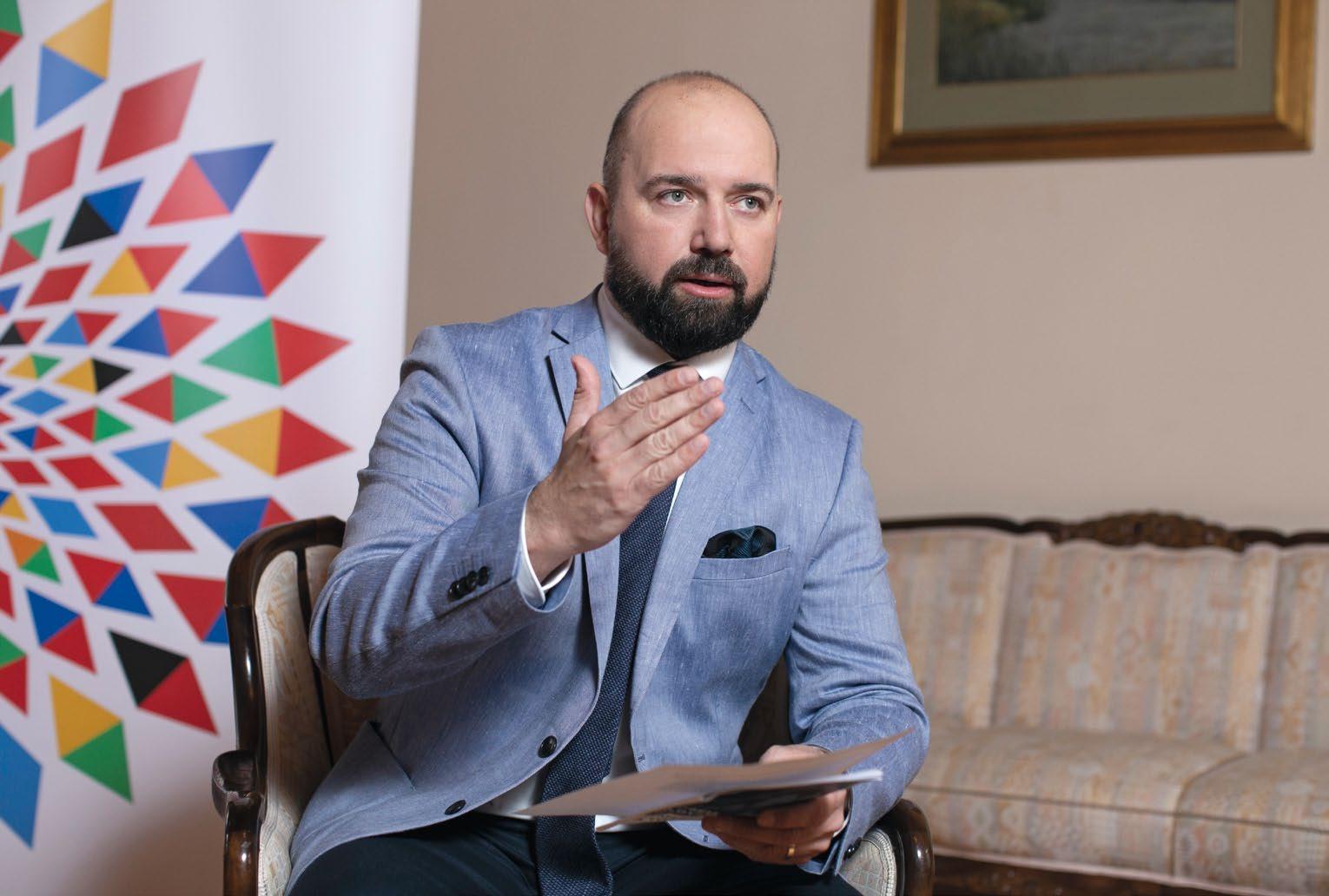
As Ambassador Tibor Bial tells Diplomacy&Trade, “we are now in the midst of virtually such a challenging period. So, it is equally important not only to be united, but also to lead by example.” He notes that the rotating presidency always takes place in Trios. In this case, France, the Czech Republic and then Sweden, hold the rotating presidency for a year and a half, and they tend to set this program together. “This program started with the French Presidency at the beginning of this year, but as we know, war broke out in Ukraine on February 24, when Russia attacked Ukraine, and that completely overruled the program, So, in practice we had to be quite flexible in our response. Therefore, the few priorities that fall under the Czech EU Presidency were redefined.”
The Ambassador stresses that “we are still living through such a challenging period. So, it is very important not only to be united, but also to lead by example. Thus, our five priorities are managing the refugee crisis and Ukraine's post-war recovery; energy security; strengthening Europe's defense capabilities and cyberspace security; strategic resilience of the European economy and resilience of democratic institutions.”
Emphasizing the first and most important point of the program, he reminds that “this is the biggest refugee crisis we are facing since the Second World War, and it was very important, in practical terms, to assure Ukraine of our solidarity and to stand up for its territorial integrity and sovereignty, which the European Union has done in full, and it is very important that the refugees who have been forced to leave Ukraine manage to integrate, either temporarily or in the long term, into the societies, the countries to which they have just moved. Here, it is primarily the countries sharing a border with Ukraine that are under the greatest pressure. Apart from Hungary, Romania, Slovakia and Poland are obviously the biggest host countries, or transit countries in this respect, because of the length of their borders with Ukraine. But I have to say that the Czech Republic absolutely understands the situation and the challenges of these countries, because the Czech Republic, although it does not have a direct border with Ukraine, many Ukrainians have lived here even before the war started – 250,000 to be exact. Ukrainians were living and working here, and naturally their families, relatives, acquaintances and friends came here to live with them once the war started. Therefore, the number of Ukrainians living here has increased to 700 000, which means that the Czech Republic can be also considered a destination country. That is why we know and understand exactly what challenges the countries
bordering Ukraine are facing, and that is why we are also trying to organize assistance for Ukraine within the European Union.”
The second point is ensuring and strengthening energy supply, because this war and this crisis have highlighted the need to rethink this strategy and to move towards diversification, in terms of procurement, raw materials and energy carriers, the ambassador remarks. It is because many countries within the European Union, including Hungary or the Czech Republic, are very heavily dependent on natural gas and crude oil from Russia. “Although we have all taken steps of one kind or another in the past, we are still very exposed. So, we had to take various steps and launch various programs in this regard. Our EU Presidency has convened a number of ministerial councils to ensure that Europe and the European Union find appropriate responses in terms of energy security,” he adds.
“Unfortunately, Russia’s war in Ukraine has shown that there is a lot to be done in these areas, too. If we look at NATO or the European Union as
platforms, we need to rethink the steps taken so far from a defense point of view to be able to ensure the security and territorial integrity of the European Union. Related to this is the need to strengthen the security of cyberspace, because as it has been said many times before, the next wars will not necessarily be fought only on traditional battlefields, but online, in cyberspace – and that way, they can cause as much, if not more, damage,” Ambassador Bial points out.
“Obviously, a lot of things have had to be rethought here, because supply chains have also been disrupted. You only have to look at the food industry as a sector, for example, because Ukraine is one of the world's largest exporters of grains, and this export has actually come to a complete standstill for a while. This has also caused a huge global crisis, because these supply chains also need to be
secured in the future, thus, various steps need to be taken in this regard. Obviously, this also includes the research and development part, because the various industries must be developed in such a way that the European Union's competitiveness is maintained, or rather strengthened, and it continues to be one of the leading players in the world,” he adds.
“Sustaining and strengthening democratic institutions is a very complex issue. Of course, the rule of law and the issue of human rights must be included, as well as the issue of anti-Semitism, but we would like to include in this point the search for war crimes and war criminals and their legal accountability. You can see that the Czech Republic is actively trying to respond to the challenges of the moment. We are trying to follow up these actions at the embassy level and trying to inform the Hungarian public about them, for example by organizing conferences,” the Ambassador concludes his presentation of the Czech EU Presidency priorities.
The European Union and NATO are the most important platforms where the two countries meet and cooperate as partners, but there are also other platforms.” Ambassador Bial highlights that the Visegrád Four (V4) should not be regarded as an institutionalized organization, but a free and open alliance in which the four countries discuss together the problems and issues of the day, where we have common ground and a common position. We try to amplify this voice, internationally or even at European level, and support each other. And where we do not necessarily agree completely, we try to understand the thinking and positions of the other side through deeper dialogue. Of course, where positions are not necessarily the same, each party will take and support their respective position.”
In addition to the V4, there is also the C5, the Central Five, which includes Austria and Slovenia, in addition to the Czech Republic, Slovakia and Hungary, he adds. This C5 platform has been set up in order to be more effective in dealing with the effects of the pandemic and the actions that needed to be taken. This platform is still alive, because the pandemic is unfortunately still with us. And then there is the Bucharest Nine, the B9, which is a platform for the eastern wing of NATO, the newly acceded countries, on security. The current war, for example, has also given this platform quite a lot of challenges.”
In 2010, during the global economic crisis, the volume of economic relations between the two countries fell from EUR 6 billion to EUR 4.5 billion. However, the Ambassador highlights, in the following ten years, turnover more than doubled and the two countries became one of the top ten trading partners for each other. “So, much so, that the Czech Republic, for example, is the sixth most important trading partner for Hungary, but I am confident that we’ll soon be in the top five. Despite the fact that the economy has stalled from time to time, or even slowed down because of the pandemic, the volume of bilateral trade regained its
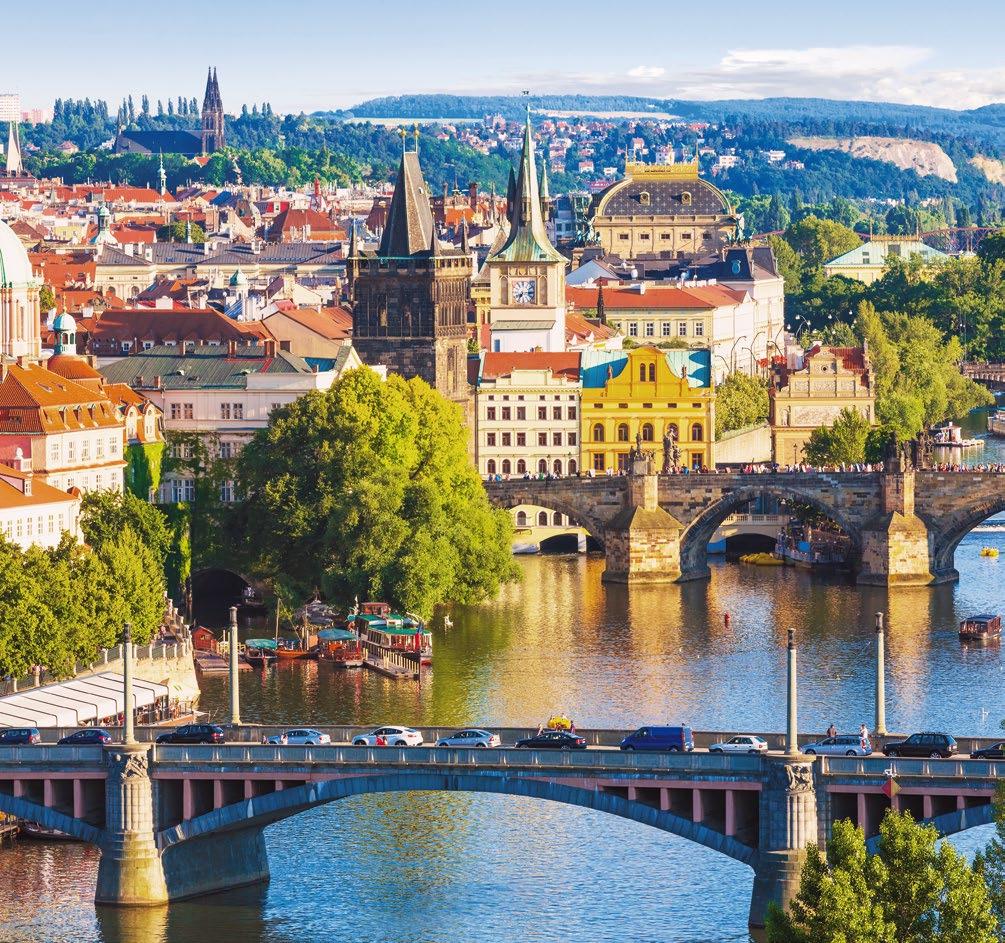
dynamism again in the last year, with double-digit growth again in the region of EUR 11 billion, and it very much looks like that this year it will exceed EUR 12 billion. There are new investments from the Czech Republic in Hungary in various industries, and Czech companies already here are expanding and developing. I think that both countries are contributing to each other's economies in a quite tangible way.”
As to how much the Czech Republic is affected by the energy crisis and how the country is preparing for the winter, Ambassador Bial notes that they are expecting an increase in energy demand in Europe in the coming months. “Since Russia is putting quite a lot of pressure on the European Union through its supply of energy carriers, both in terms of supply and prices, we had to react very
quickly. In the Netherlands, we managed to open an LNG terminal with a capacity of about one third of our annual gas consumption. We have asked the operators of our gas storage facilities to accelerate the build-up of gas reserves to as high level as possible, and this reserve is currently around 90% of our total capacity. It is the next third, by the way, in terms of supplying our total annual gas demand. In addition, of course, we have also tried to open up new networks from the west and the north, both in terms of oil and gas, and we are also looking at other opportunities. We have pipelines from Germany, which are a further guarantee for us and we also have one from Poland under construction.” He adds that there are also medium-term projects, such as the expansion of the Dukovany nuclear power plant, which are being accelerated. Regarding steps easing the population’s burden, government decisions have been taken or adopted in recent
weeks to cap prices and ensure energy security for the citizens and public institutions. “In addition to that, we have obviously made everyone aware of the need to conserve energy as much as possible. Also, various other programs have been launched, such as one-off grants for children and other packages for residents to help, if not cover, then alleviate their increased cost of living. These automatically affect 70% of the population.”
As far as cooperation in the cultural and civil spheres is concerned, the Ambassador says that they have focused quite strongly in the last 4-5 years on bringing the relationship between the two countries down from political level to that of everyday people, “so, that ordinary people can also feel the opportunities and beauty of the relationship between the two countries. We wish to show to Hungarians that the Czech Republic is not just about the fact that it has a beautiful capital, Prague, and we have very good beers and, say, Skoda is the best car, but that Hungarian people can learn more about the Czech Republic more than that – it is vice versa! In cooperation with Hungary, the Hungarian Embassy in Prague and other organizations, we are working to help our Czech compatriots to learn as much as possible about Hungary, about the beauty of Hungary. On the one hand, we have launched various programs that involve students, such as exchange programs, mutual camps and visits to each other. Five or six years ago, we revised the twin cities cooperation and said that we do not necessarily focus on quantity but rather on quality. We have organized a number of twinning meetings and conferences, including here at the Czech Embassy, where we have, of course, also involved companies that offer services or solutions to municipalities.”
He highlights that Czech culture in Hungary is practically promoted in the Czech Center located in the Embassy building. “They are the main custodians of cultural cooperation between the Czech Republic and Hungary here in Hungary, and they are doing so quite actively. This October, an exhibition on glass was opened, where Czech designers and artists appeared, but there are many other such exhibitions – as are a good number of literary and literary presentations and book launches, either here in the Embassy building or, for example, as part of the Night of Literature program, which is also not only in Budapest but also in the countryside. “We are also pleased to report that we opened our EU Presidency in Hungary with a concert by a choir of young people from the Czech Republic in the park in front of the Liszt Ferenc Music Academy in Budapest on the first of July. Also this fall, we celebrated our national day and before that, we organized a concert by the previous winners of the Virtuosos television talent show. Participants of the concert from both Hungary and the Czech Republic played the anthems at the reception itself. Of course, this cultural cooperation, these presentations, will have a final chord at the end of our Presidency, at Christmas, also in the form of a concert. However, it not only music or literature, but also several exhibitions have been or will be opened in the field of fine arts. I think that we have a lot of things to look forward to here in the near future,” Ambassador Tibor Bial concludes.
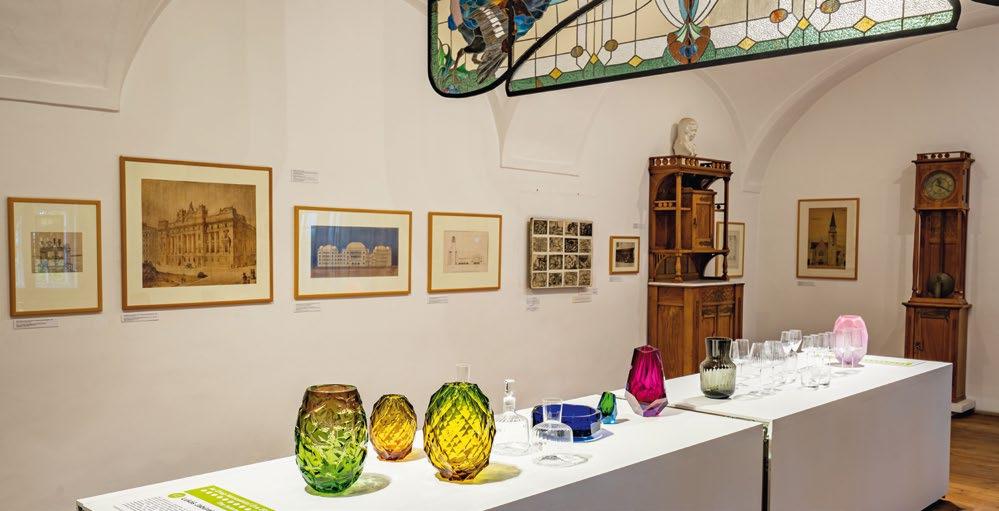
CzechTrade is the state export promotion agency of the Ministry of Industry and Trade of the Czech Republic. Its aim is to develop international trade and cooperation between Czech and foreign companies. The Director the agency’s Budapest office, Dóra Egressy tells Diplomacy&Trade about the scope of their activities in Czech-Hungarian business relations.
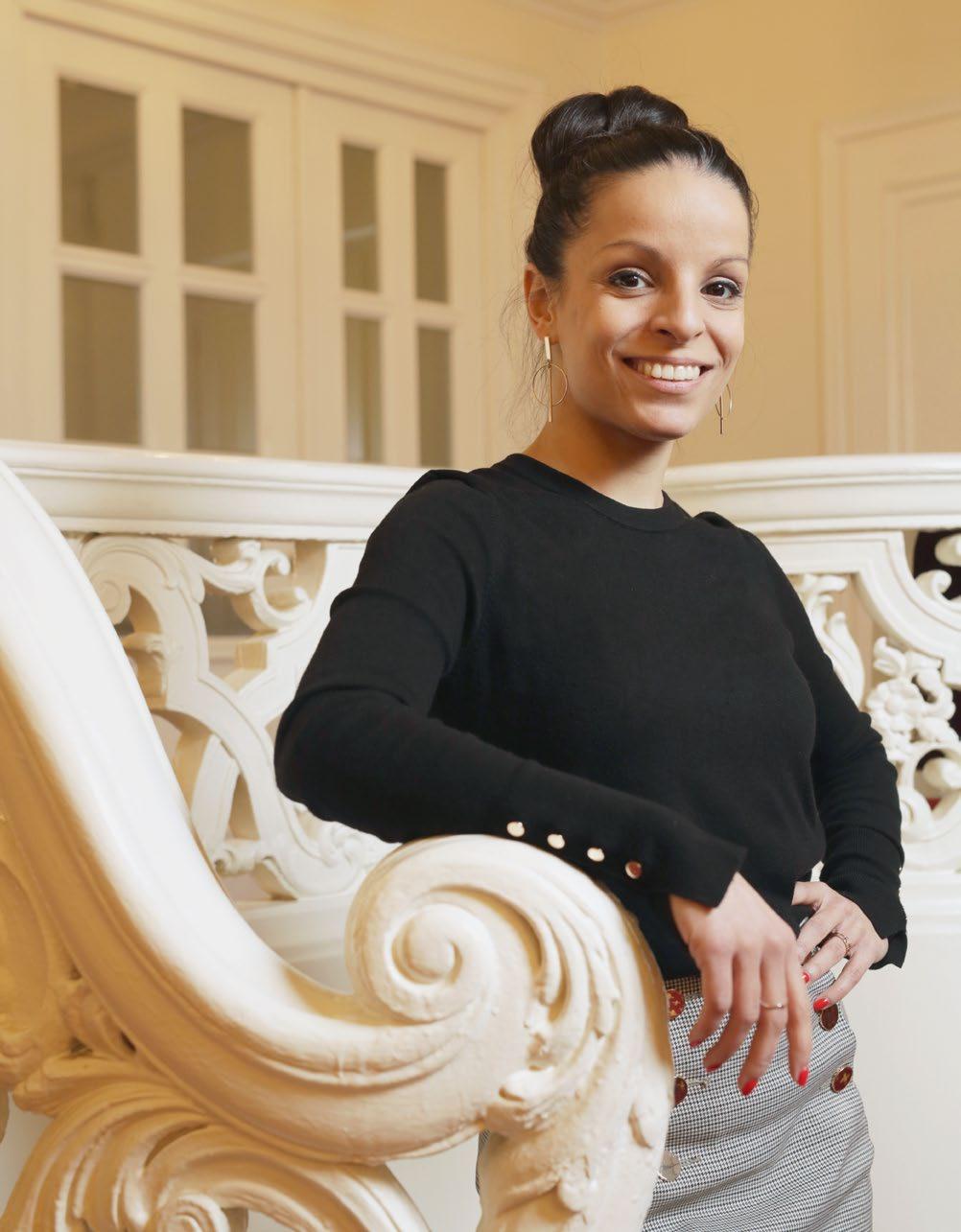
As she explains, “CzechTrade is here to help businesses primarily on a B2B basis which means we are supporting Czech companies to meet their new Hungarian partners or distributors on many levels. From finding the right contacts to organizing faceto-face meetings through being present at various fairs organized in Hungary, we do all our best to get the deal done, the partner to be found. We can also help Czech companies to grow in their B2C activities, for instance, by developing strategies to improve the visibility of the brand in Hungary or by connecting them with agencies that can help with digital media campaigns, PR activities or advertisements.”
Another part of the agency’s activities aims at helping Hungarian companies to find their Czech supplier. One process involves submitting a detailed online enquiry of the service or product, which CzechTrade distributes via newsletters and webpages. “As a next step we proactively call the potential suppliers with the offer. In case of a bigger project, we can organize a Sourcing Day, when we first help to find and pick the right companies and organize a oneday meeting in Prague with the buyers of the Hungarian company on one side and the potential Czech partners on the other. We have many references, like MOL or GE in Hungary, Jaguar Land Rover or OBI abroad. We provide these foreign enquiries free of charge,” she adds.
Focusing on Czech companies willing to do business in Hungary, the first step is to fully understand the company’s activity, the product or service they would like to introduce and also their aim on the foreign market, the Director points out. Most of the time, the market entry strategy is built on finding a suitable partner or distributor. “Thus, we prepare market research to find the possible business partners. After approval from the client, the next step is to find
In the past 12 years, the cross-border turnover of goods rocketed from EUR 4.4 bn to a record high EUR 10.9 bn while in the period from January to September this year, the crossborder turnover reached EUR 9.5 bn, “thus, there is chance that we can celebrate a new record this year. Hungary is the 10th most important foreign trade partner for the Czech Republic,” Dóra Egressy notes.
out which companies are open to cooperation and to arrange face-to-face meetings or videocalls, including translating or interpreting services if needed. Also, for companies who intend to step onto the Hungarian market, we offer a possibility to reach out to the sector at various fairs and exhibitions (AgroMash, Construma, SIRHA, Industry Days) in Budapest in our agency’s booth. This is something a lot of companies take advantage of.”
Besides this ‘core business’, CzechTrade constantly monitors the needs and expectations of the companies, alongside with the actual global challenges and adapts it services accordingly. The new service ‘Digital Marketing’ focuses on the localization of the online platforms and e-selling capabilities of a given company. “Another service that we offer is the Export Incubator, which will help companies get introduced to the local business and legal environment right in the given territory. We have two such running projects launched recently: one in Chicago and one in Bangalore but we will have new ones soon.
Another of our services is connecting companies with designers in the frame of Design Center CzechTrade. The follow up is also very important to us. We are not losing contact with the client at the end of the searching process. We keep in contact, follow the developments and are ready to step in to help once again if needed,” she says.
“Hungary is in a great position when considering Czech exports. It is easily accessible and despite of the two very different languages, both sides are open to cooperate in many different business areas. The main areas of the bilateral trade are automotive industry and electronics, but according to my experiences, the FMCG sector is also high on this list, along with machinery, construction and various services. There is rising level of cooperation in the defense industry and in the energy sector as well. Our newest enquiries in Hungary’s direction are the IT sector, e-commerce and companies with sustainability and smart solutions,” Dóra Egressy highlights. As for major players in bilateral economic cooperation, she emphasizes that “luckily, we can find a Czech company in literally every segment in Hungary. We can definitely mention several success stories like that of RAVAK, Alukov, SAPHO, LIKO-S and CPI Group in the construction industry, Alza.cz, operator of the Alza.hu e-shop, Kifli.hu (part of Rohlik Group), DODO and NOTINO from the
e-commerce field, Peterka & Partners, Gordia, ASB Group, Akcenta, or RENOMIA for the legal, financial and insurance services sector, all the Czech beer and spirit companies, brands like Pilsner Urquell, Bernard, Postřižinské, Becherovka or Bidfood, Emco, Crocodile and Mattoni 1873 in the food industry. When we see a Škoda car, a trolley or bus by Ganz-Škoda (Škoda Transportation) it is easy to associate with the Czech Republic. However, only few people know, that, for example, the benches on Kossuth Square or in Millenáris Park in Budapest are made by mmcité, the manufacturer of carefully designed street furniture. Or that the huge chandelier that decorates the lobby of the Budapest Four Seasons Hotel is made by Preciosa. When you next dial a Yettel number, bear in mind that it is in Czech majority ownership as well, as the main owner of the telco company is the PPF Group.” Regarding successful Hungarian investments in the Czech Republic, the biggest ones are MOL Česká Republika s.r.o, Innogy (subsidiary of MVM), Egis Praha s.r.o and Gedeon Richter Marketing ČR, or Delpra representing Pick Szeged.
The CzechTrade office in the Hungarian capital was reopened in 2010 and the Director stresses that “there have been many highlights very close to our heart. Certainly, the ‘Nice to MEAT You’ cooking shows organized with Bidfood
Hungary, are among our favorites, just as the Czech-Hungarian legends’ ice hockey match in 2015. In the past 3-4 years, we started to focus more on the topic of sustainability and smart city, entailing that together with the Embassy of the Czech Republic in Hungary and the Ministry of Industry and Trade of the Czech Republic, we have created a wonderful project, ‘City For The Future’ which debuted in Hungary at the Civitas Sapiens Conference in September 2021. Our top event in Hungary so far has been on this theme as we organized it – together with the National Assembly of Hungarian Municipalities (TÖOSZ) –, at the HUNGEXPO fair site in Budapest in May this year, hosting almost 500 participants. ‘City For The Future’ is growing internationally as you could see such an exhibition at the DUBAI EXPO in January and in Barcelona Smart City Expo World Congress this November as well.”
In conclusion, Dóra Egressy notes that Hungary, being the ‘Honorary neighbor of the Czech Republic’, has been an enticing export destination for Czech companies for a long time – so has the whole CEE region.
“Just as for Hungary, for the Czech Republic, Germany is the number one foreign business partner. Our network of 49 offices is divided into nine regional centers out of which the CEE, including Hungary, Poland, Austria, Germany and the Benelux countries.
Yettel Hungary Ltd., one of the nationwide mobile phone operators in Hungary, is spending HUF tens of billions to modernize its mobile network nationwide, having acquired several spectrum parts at the national tenders for frequency. Diplomacy&Trade asked the Chief Legal and Reputation Officer at Yettel Hungary, Márk Erdélyi, what this modernization entails and in what stage the company’s network development is.
“In 2021, we started a nationwide network modernization project to increase our network capacity 2.5 to 3 times and provide our customers with a network that is faster and more reliable in several ways. The project also enables the launch of new services such as VoLTE roaming, VoWifi and private mobile networks, helps increase the capacity of the 4G network, which already has nationwide coverage, and paves the way for 5G development. We are now about halfway through the entire network modernization process, with a total investment budget of HUF tens of billions,” Márk Erdélyi says. He adds that in terms of business strategy, Yettel is currently focusing on three big areas: “our Prime consumer tariff offering, 5G-based Fixed Wireless Access services for home and office use (we are still at the beginning of the journey, but we see them as a good alternative to fixed-line services), and industrial solutions such as the private networks mentioned earlier. A recent example for the last one is our 5G private network for Delta Technologies.”
Constant innovation through research and development is a must in telecommunications. It is one of the reasons why Yettel has signed an agreement with Óbuda University in Budapest. As for the benefits for the two sides, the Chief Legal and Reputation Officer points out that this strategic partnership with Óbuda University is another milestone in Hungarian mobile communications research and development.
“This involves the installation of a mobile communications network using 5G
technology at the university campus, as well as collaboration with the higher education institution in the fields of education and recruitment. We are confident that by deploying a 5G mobile network, we can contribute to the university's development program, which aims to explore the potentials of 5G and the practical features and benefits of the new technology. We believe that this will also contribute to the university’s professional growth and help them accelerate their development efforts.”
Yettel is part of the PPF Group that is present in various market segments, including telecommunications, in several parts of the world. Márk Erdélyi stresses this extensive international background greatly helps Yettel and its customers. “Being part of the PPF Group, our parent company, we are member of a stable group of companies planning to invest in Hungary in the long run. Our customers also benefit from us focusing not only on short-term solutions. Synergies from the collaboration between the countries included in PPF Telecom Group, PPF's telecommunications arm, are also being leveraged at a group level. A case in point is our recently launched handset insurance service allowing customers to insure their mobile device for a small fee, which is particularly useful for those who want to protect their valuable mobile phones. Soon, we’ll also jointly introduce a new network security tool within the group.”
Yettel’s Chief Legal and Reputation Officer very much agrees with the statement that sustainability is a key issue that no responsible
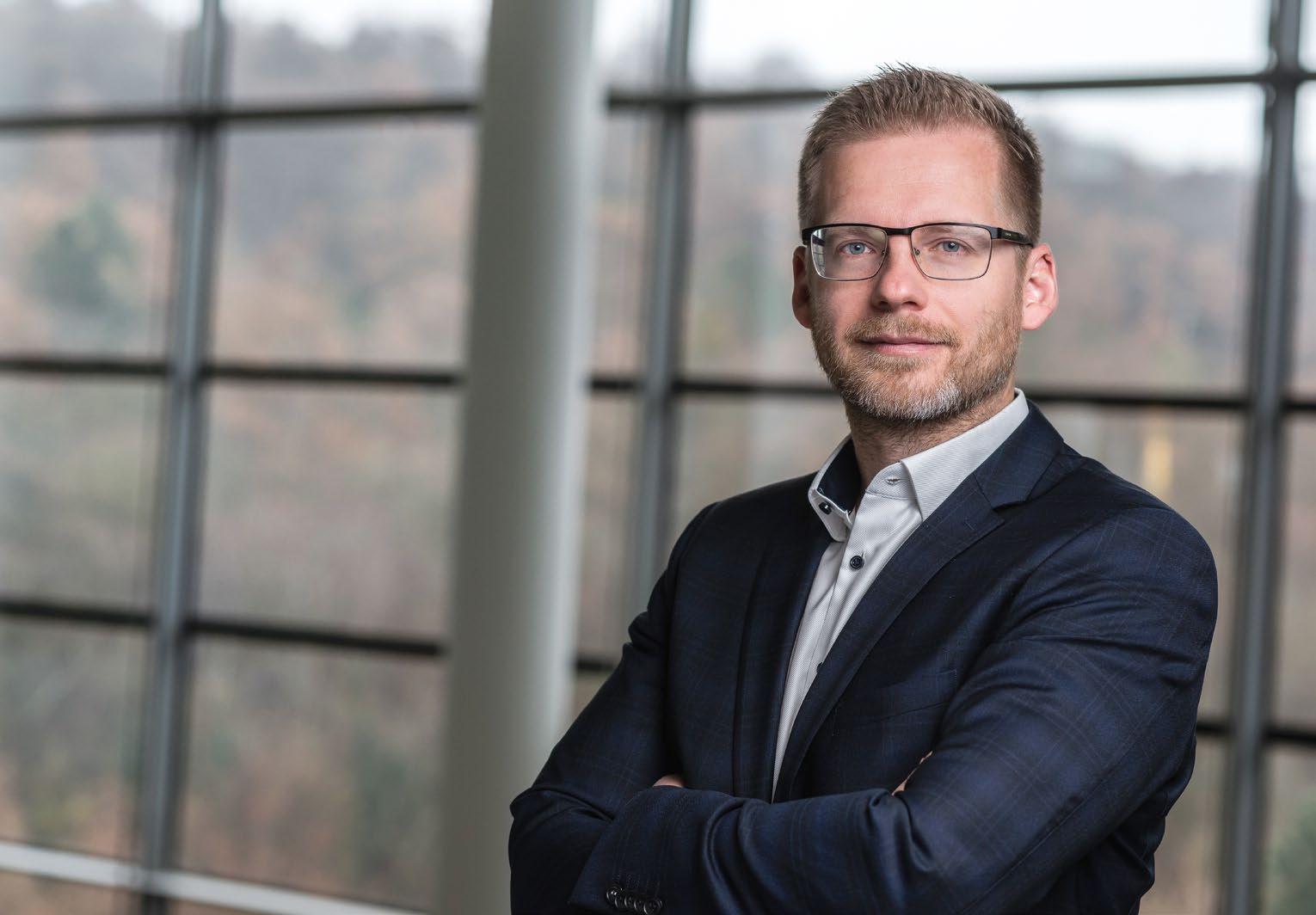
company can ignore nowadays. “This is a very topical issue because, although sustainability has always been important in our company’s life, PPF Group has just recently adopted an overall ESG strategy. In early December, we will publish our latest Sustainability Report. We believe that a business can be sustainable only if it incorporates all three pillars of sustainable development, that is, environmental and social considerations in addition to governance. We are proud that upon its opening, our office building was one of the largest environmentally conscious projects in Central Europe, and today, it is still one of the most state-of-theart and environmentally friendly corporate headquarters in Hungary. Our digital education program, ProSuli [‘ProSchool’] – currently incorporating 135 schools as members – has been running to promote and develop digital education methodologies since 2015,” he notes.
One of the challenges of our times is the energy crisis. This October, Yettel announced a developer competition to encourage the identification and development of technological solutions to tackle this problem. Márk Erdélyi highlights that “the aim of our ‘Hack It Your Way’ developer competition was to provide innovative, disruptive technology solutions to current social challenges. More than 200 teams from nearly 30 countries entered the competition featuring three themes. The winning teams submitted concepts for a blood transport drone, a unified public transport application, a digital professional social network and an energy efficiency solution. In addition to the total cash prize of HUF 5 million, the finalist teams could also engage in valuable professional networking with Yettel’s experts and mentors.”
Regarding the main guidelines of Yettel’s corporate social responsibility policy, he explains that “we are focusing on both our closer and wider communities. When the war broke out in our neighborhood, we donated nearly 10,000 topped-up SIM cards, 400 mobile phones, WiFi hotspots and other communication devices to help the refugees. In the summer, we launched a major campaign to collect old mobile phones and raise awareness of the importance of recycling. Last Christmas, together with the Hungarian Red Cross, we launched a HUF 50 million Digital Inclusion Fund to support the digital inclusion of socially deprived people. We are the main sponsor of KórházSuli [‘HospitalSchool’], a program helping children disadvantaged due to their health condition catch up with their studies, and we have also been a long-time partner of the Hungarian Reformed Church Aid with which we launched the Digital Springboard competition to promote digital inclusion two years ago.”
Yettel (with its legal predecessors) has been on the Hungarian telecommunications market for almost three decades now, and it is ready to stay. “We have been a stable and long-standing player in the mobile market and we want to keep it that way also in the future. PPF is committed to the Hungarian market and is planning for the long term. We will continue to focus on delivering mobile services on our high-quality network and seek solutions that address the changing needs of our customers, also in the longer run. 5G will help us do that, among other things,” Márk Erdélyi concludes.
The main objective of the CsehMagyar Üzleti Klub (CzechHungarian Business Club), established in 2004, is to develop bilateral business relations and promote cooperation between Czech and Hungarian businesses. In addition, the Club aims to create a forum for its members –be they companies or individuals – to deepen their cultural and human ties in addition to their business contacts. That Club also wishes to contribute to the two countries, the two nations, getting to know each other's values better and further develop the traditional cooperation to the benefit of both sides.
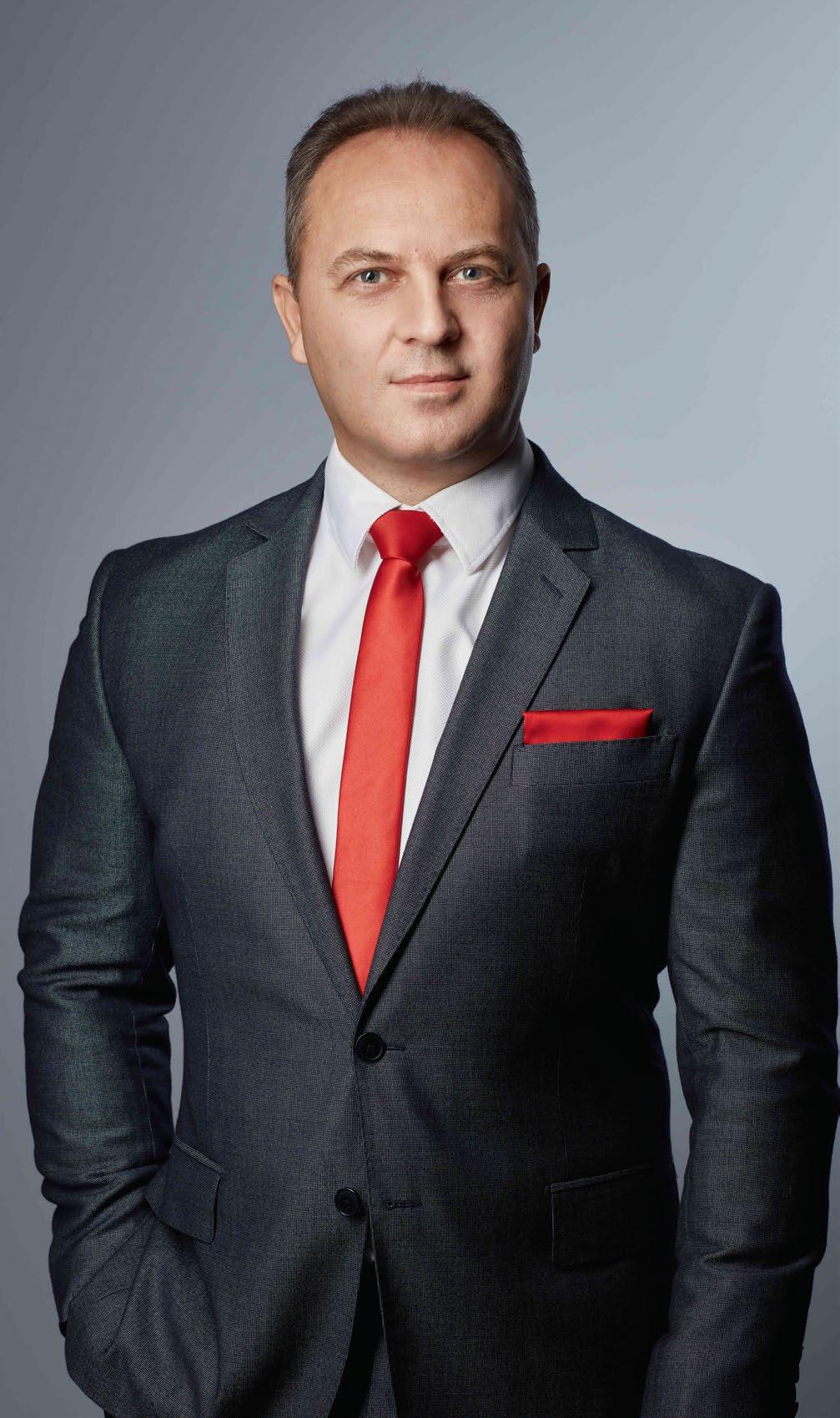
As the President of the Club, László Vajányi points out to Diplomacy&Trade, “success in the life of a business club is when its members find successful business opportunities through club membership, or when a business leader is able to make the best decision based on the opportunities they hear about and experience in the club. The important thing here is not the club, itself but the members who join the club to help each other, share their experiences about Czech trade activities and create new and new business opportunities for themselves and their fellow club members in the framework provided by the club.”
Citing some concrete examples, he highlights that “we held an international business meeting for the automotive industry in the four Visegrád countries. Last year, within the framework of international support from the Czech government, we organized major tenders for companies from the Czech Republic entering the Hungarian market and Czech companies operating in Hungary. Such an international tender took place in 19 countries in the world and we know that our organization, for example, reached the most applicants and won the most tenders, fully exhausting our possibilities. Given all this, we still consider as the biggest success for our club when members win one of their best business opportunities through their membership here.”
able to work with them in a similarly effective way, both in terms of information and events.”
Concerning the Club’s role in facilitate business relations between its members and external partners, László Vajányi stresses that there is no template for this. “We have a common internal marketplace, we have a business network around our members and because we are members of the EU Chambers, we reach out to all members of other bilateral chambers, clubs and associations, which can mean tens of thousands of potential business partners.”
He adds that all sorts of topics and issues/ challenges are discussed at club meetings.
“We try to reflect on the current situation and these shape the themes of our events. This was also the case at our last event, where energy, cyber defense and the automotive industry were the topics.”
According to the Club's statutes, it is also an advocacy organization, representing the interests of its members with the Hungarian government, municipalities or other decision makers. As the President points out, “we are involved in trade issues and in this field, we cooperate with local governments and even participate in intergovernmental meetings.”
Meetings of the Czech-Hungarian Business Club are held in a relaxed atmosphere with delicious Czech food and beer. “We regularly sit down to the table with festive Czech food and our favorite, sparkling, frothy Czech, beers. One such event we host every year is the Czech Beer Festival, which, as well as being a treat, always brings business opportunities,” he says. Of course, members of the Club contribute to bilateral relations beyond the business sphere, for example by deepening cultural and people-to-people contacts. In this regard, László Vajányi explains, the Club has, for example, organized a cultural and culinary trip to the Czech Republic, to South Moravia, with a rich program of activities, “just for ourselves, to enrich our knowledge of Czech culture, history and gastronomy together.”
Membership in the Czech-Hungarian Business Club is growing. As for the value of membership in this club, the President explains that “over the last decade, business relations between the two countries have intensified and interest has increased in both directions, therefore, we are contacting the companies participating in this process. With new entrants, we can share primarily our experience, be it sectoral, commercial, legal or accounting. This can save time and sometimes money. Our aim is to maintain our ‘club’ character, with friendly exchanges of experience and interesting and valuable professional events.”
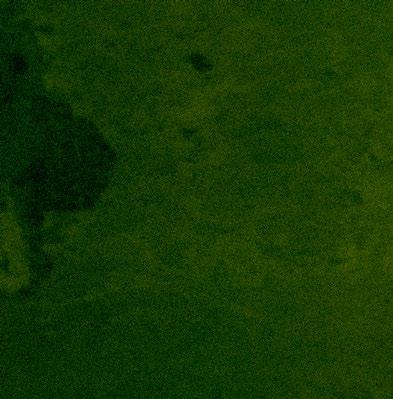






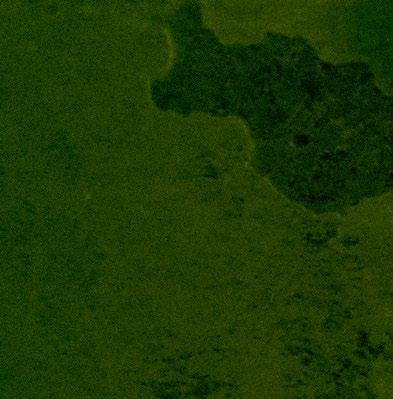







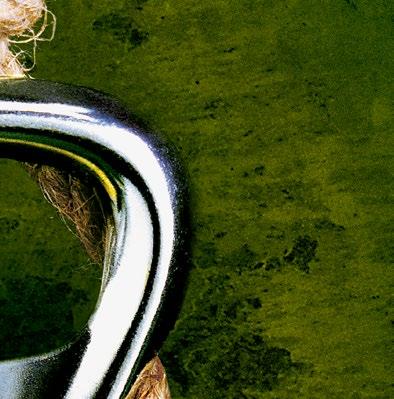











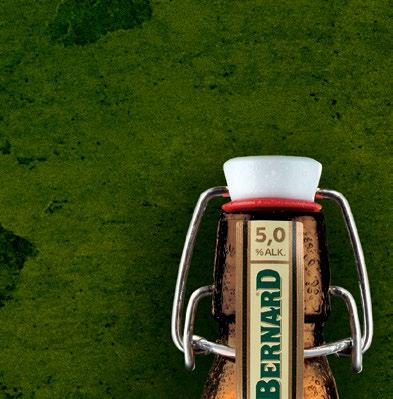





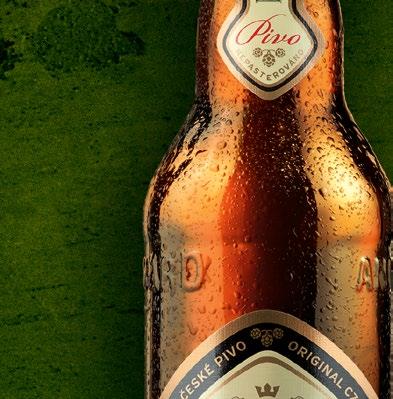








Cooperation between the Czech Republic and Hungary is developing dynamically in all areas. This includes economic cooperation in various sectors, where in the energy sector, ŠKODA JS plays an important role. ŠKODA JS has historical bonds in Hungary and is today building on and developing these bonds, making a significant contribution to the modernization of the Hungarian energy sector. Miloš Mostecký, Commercial Director of ŠKODA JS, presented to Diplomacy&Trade the company's history, present and future prospects and its plans in Hungary.
In the mid-1950s, the first attempts at peaceful use of nuclear energy appeared around the world. Czechoslovakia was one of the pioneers in this field. As early as 1956, a specialized department was established at Škoda to prepare for the construction of the first Czechoslovak nuclear power plant. This is the birth date of today's ŠKODA JS. We have been co-creating modern nuclear power for more than 65 years, Mr. Mostecký says. “We have the enormous advantage of continuity in the industry, building on our own and international experience, monitoring the development of the sector and in many cases contributing to it.”
ŠKODA JS a.s. is one of Europe's leading engineering and manufacturing companies with experience in the construction and servicing
of nuclear power plants. During its existence, the company has supplied investment units, equipment and services for nuclear power plants, research reactors and spent nuclear fuel storage facilities in Central and Eastern Europe, Scandinavia, France, Germany, USA, Austria, Finland, Belgium, PRC, Armenia and other countries. It has manufactured and delivered 21 complete VVER 440 type nuclear reactors and three VVER 1000 type reactors. In Hungary, ŠKODA JS delivered all four reactors of the existing Paks Nuclear Power Plant and also provided, for example, a complete upgrade of their instrumentation and control system. Since the 1990s, the company has also focused on Western markets and technologies. It cooperates with the world's leading companies in the field. Today, for example, it is working on a major
It is very important that ŠKODA JS has retained its character as a versatile company offering partners the most comprehensive solutions. It combines production, service and engineering under one roof, which, in addition to the know-how in the individual fields, brings the possibility of cooperation across disciplines and simplifies the supply chain for the customer.
An example is ŠKODA JS's key contribution to the completion of two units of the Mochovce nuclear power plant in Slovakia. The third unit is in the start-up phase, while work is continuing on the fourth unit towards its completion.

“At the Mochovce NPP in Slovakia, we are successfully learning how to work under the conditions of the latest European legislation and technical standards, we are one of the few companies that have up-to-date experience with such type of nuclear project. We are convinced
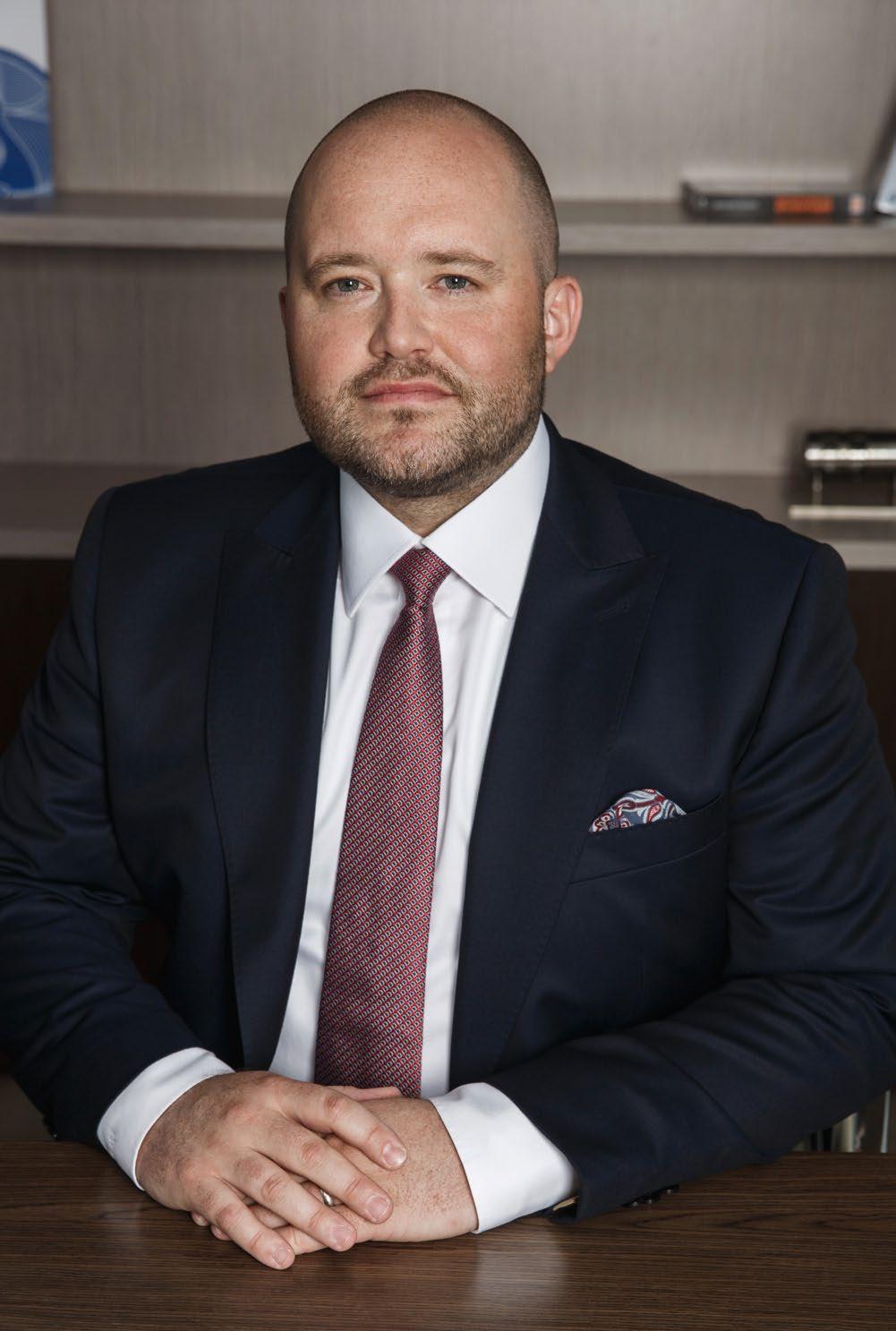
that we will have the opportunity to apply our knowledge, experience and know-how in the construction of new units not only in the Czech Republic,” Mr. Mostecký says. “Of course, we also transfer our experience to our work in Hungary.”
In the 1970s and ‘80s, all four complete VVER reactors, i.e. pressure vessels including internal parts and control rod drives, of the Paks NPP were manufactured in Plzeň and installed under supervision of ŠKODA JS. In 2015, ŠKODA JS won the tender for the replacement of the control system at all units of the Paks NPP. The project was completed in 2020. “The reliability and safety of our equipment was confirmed in the test run on all units. This project increased the level of safety operation of the plant as well as it is one of important systems making possible extension of lifetime,” the Commercial Director points out. He adds that this was an interesting and extensive ‘turnkey’ modernization project.
ŠKODA JS with its partners (a Czech one and a local as well) replaced at Paks NPP the existing Reactor Control Systems, Reactor Rod Control System and Reactor Trip Breaker System with
modern digital equipment. ŠKODA JS fulfilled the role of EPC contractor, creator of the Basic and Detail Design concepts. “Here we also apply our ability to effectively manage projects in an international environment, where supplies from the Czech Republic and activities provided by our Hungarian partners were integrated in one supply model.”
In 2021 ŠKODA JS concluded a framework contract with the Hungarian company MVM ERBE for engineering support – assessment of project documentation – of the Paks 2 project. Further negotiations are underway on the spectrum and scope of ŠKODA JS's involvement into other projects of reconstruction and building up new power units in Hungary.
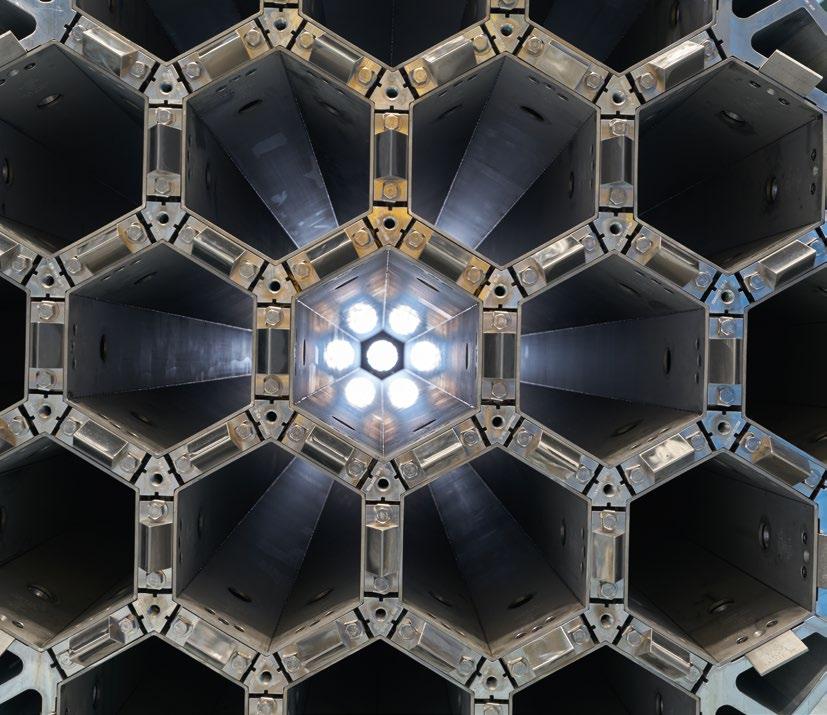
The company’s Representation Office in Budapest (BROS) was established at the end of 2017 with the aim of obtaining the best possible position for ŠJS in preparation and future deliveries for the newly built Paks 2 NPP in Hungary.
“The Paks 2 Project is a suitable target of our interest in the field of engineering activities in the preparation and implementation of
new units, as well as our efforts as a supplier in the field of equipment for nuclear power plants,” according to Miloš Mostecký.
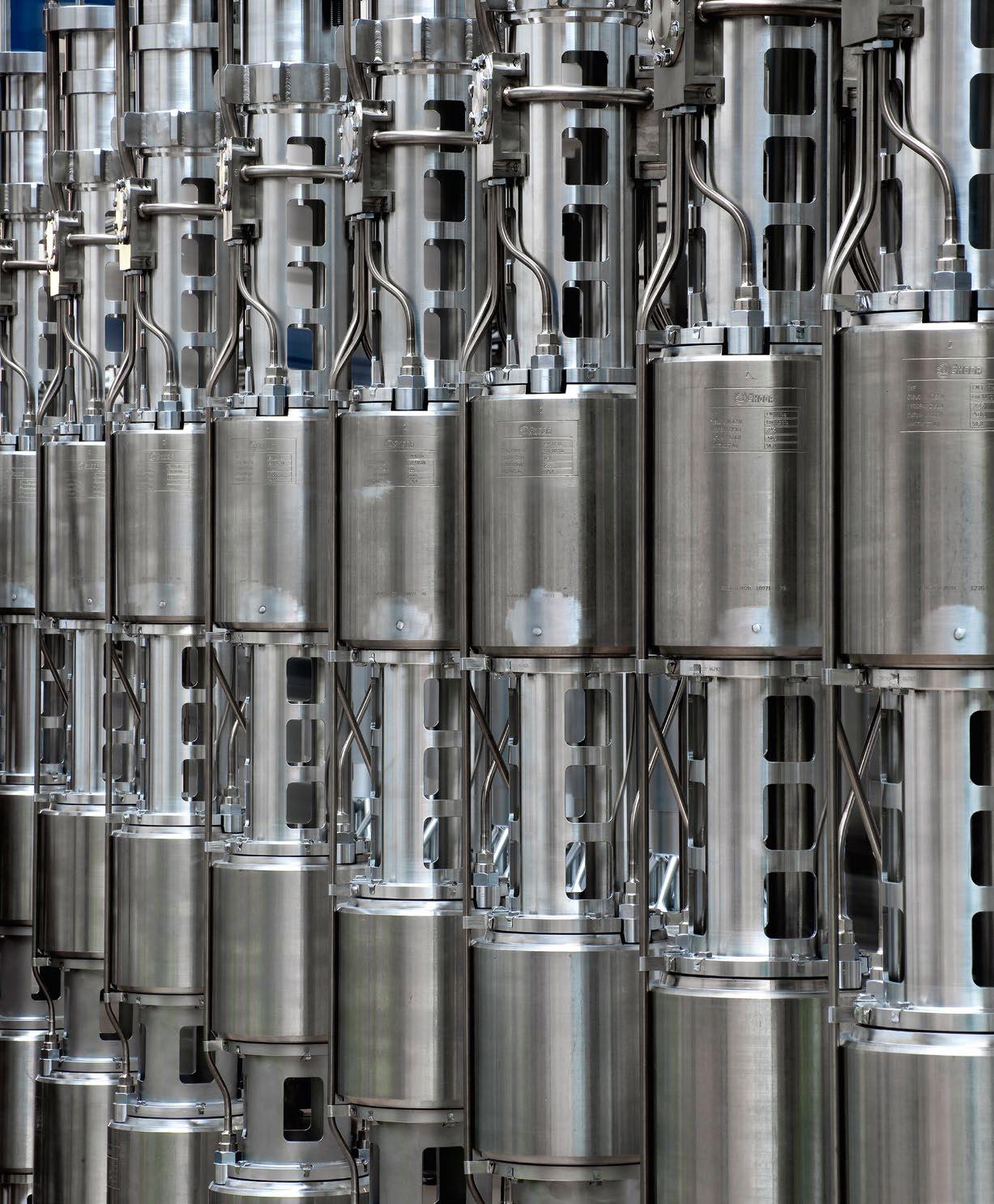

An integral part of BROS's work is obtaining information about interesting contracts and support for gaining our position in Hungary. It is therefore a search for business opportunities both in the field of nuclear energy (preparation and installation of the new nuclear power plant Paks 2 and support during the operation, maintenance and repairs of the Paks 1 power plant), but also obtaining engineering contracts outside of nuclear energy in areas close to the company's profile, especially in the field of Hungary's conventional energy, modernization of heating sources and the chemical and petrochemical industry. These activities are carried out in close cooperation with local companies as well as with the Czech Embassy and Hungarian Branch of Czech Trade organization,” the Commercial Director notes. Regarding the plans of Business Representation Office of ŠKODA JS in Hungary, Miloš Mostecký emphasizes that BROS will continue to develop
those tasks that were set before it, i.e search for business opportunities both in the field of nuclear energy (taking part in preparation and installation of the new nuclear power plant Paks 2 and give support during the operation; maintenance and refurbishment of the Paks 1 power plant), but also obtaining engineering contracts outside of nuclear energy in areas close to the company's profile, especially in the field of conventional energy industry, modernization of heating sources and the chemical and petrochemical plants. Long-term tasks include obtaining the maximum share of the European (Hungarian) supply for Paks 2 in cooperation with Hungarian companies, becoming an indispensable partner for the modernization and operation of Hungary's energy resources and taking part in the field of modernization and maintenance of the Hungarian and Slovak petrochemical facilities.
ŠKODA JS has newly become part of the largest Czech energy company ČEZ, a.s. Under its new ownership, the company plans further dynamic development not only in Central European markets. “We are successfully continuing to develop our activities in all areas of our activity.
Currently, also thanks to the connection with ČEZ, other markets in Europe are opening up for us, I believe in ending the war in Ukraine, restoring its energy infrastructure and therefore in the continuation of our good business relations in Ukraine. No less important the long-term cooperation in the production of parts for French reactors (currently for English EdF projects) as well as involvement in the preparation and implementation of small modular reactors (SMR), which is the possible further development of nuclear energy. We believe in the development of nuclear energy and want to be an important part of supply systems in the construction of new sources, especially in Europe,” he says.
“Hungary represents a very important and promising market for ŠKODA JS, where we want to build on a long tradition of cooperation with local and international partners.
I am convinced that our representation team will actively contribute to this, with the task of developing existing contacts and preparing new opportunities,” the Commercial Director concludes.
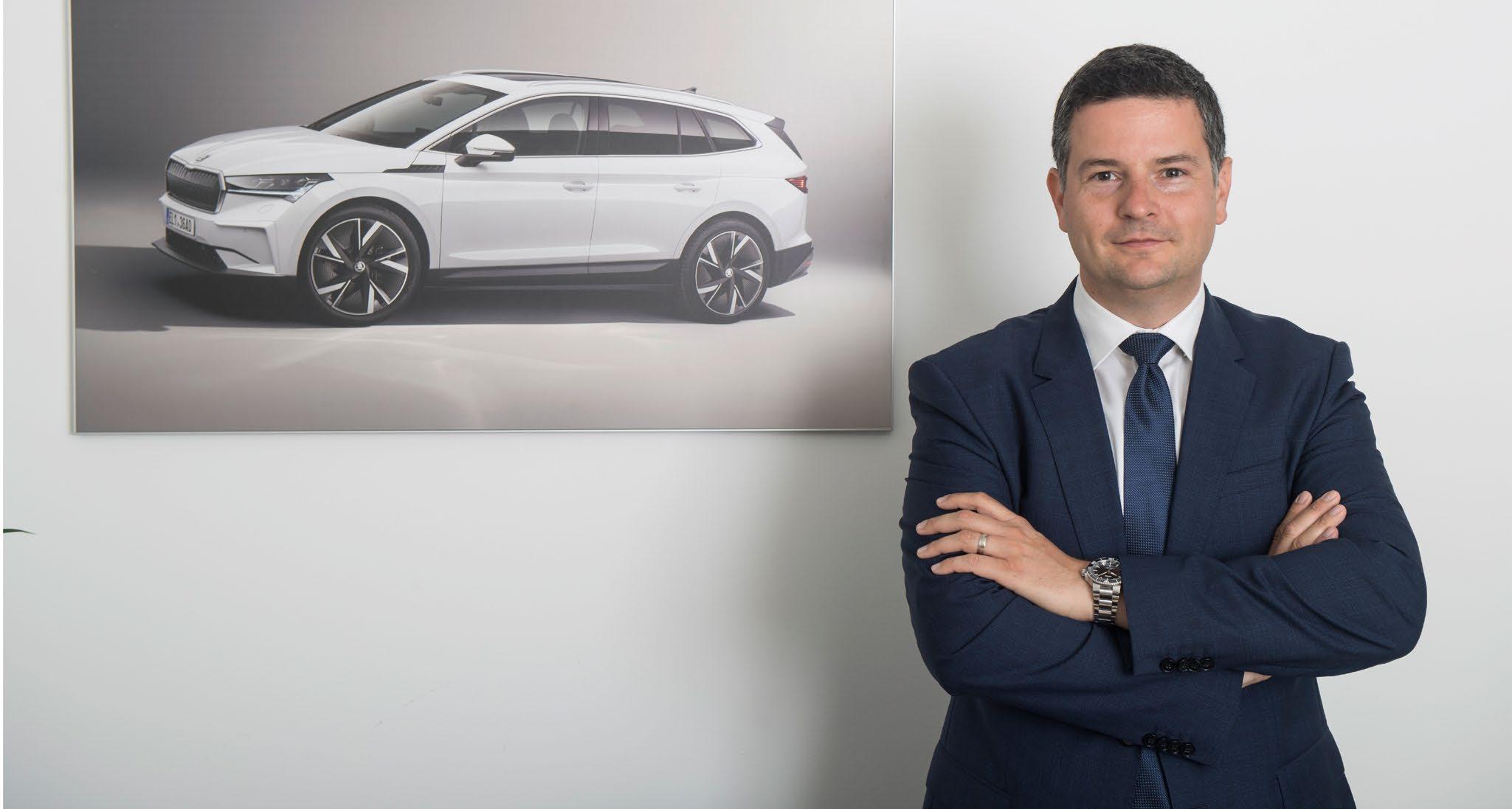
Most people in the eastern half of Europe have fond memories of ŠKODA's iconic models – the ŠKODA 100s and 120s –, while the newer models FABIA and OCTAVIA have been family cars for generations. The Czech brand has undergone a huge transformation in recent years, not only by becoming one of the leaders in electromobility, but also by completely changing its model range. ŠKODA's brand director in Hungary, János Németh explains to Diplomacy&Trade how the Czech car manufacturer has come from an affordable small car brand to one known for company limousines and to a premium segment electric sports car.
According to the European Union's latest mobility regulation, from 2035, cars with conventional internal combustion engines may no longer be sold in the Member States. As to how ŠKODA will be able to adapt to this regulation, the brand director reassures everybody that “fortunately, we don't have anything to worry about regarding this deadline, we already have electric models and our portfolio will continue to expand, with three new electric models planned to be launched by 2030. We also aim to have at least 50% of sales of pure electric models by 2030. This way, as the electromobility transition accelerates, we will meet the 2035 deadline without any concerns. In fact, we plan to complete ŠKODA’s transition even sooner. By the way, electromobility is not the only solution for adapting to the 2035 regulations. Synthetic fuel could also be an option. Today at ŠKODA, we believe that the future of mobility is based on electricity, but we are aware of the fact, that maybe, there will be other ways to reduce the CO₂ emission of passenger cars to zero.”
Aiming for affordable, safe and modern models
One of ŠKODA's biggest advantages over its competitors was price: ŠKODA customers could buy models of satisfactory quality at a low price. In reaction to the question whether existing ŠKODA customers will be able to afford the more expensive electric cars, János Németh notes that “in the current economic situation, everyone has to accept the unfortunate fact that they will not be able to buy a new car cheaply. I would add that new cars have never really been cheap. And the reason why our current prices are higher than they were years ago is because we are gradually changing category with the ŠKODA brand. Our latest electric model, the ENYAQ COUPÉ RS iV, is now clearly in the premium category, with advanced driver assistance systems and a very advanced electric powertrain. It brings technologies to a modern ŠKODA model that have been the preserve of classic large German luxury brands. So, naturally, the prices are going up, which means that our customer base is changing: our current task is to show how

much ŠKODA can offer a customer. Of course, the engineers are also working on electric models that will be more widely affordable, because we don't want to become a luxury car brand: the aim is still to deliver affordable, safe and modern models to customers.”
When speaking of electric models, the issue of range problem often comes up. Of course, when considering this, one needs to take a look at the related infrastructure in place to see whether electromobility transition a reality in a given market. As to what a car manufacturer can do to help this electric transition, ŠKODA's brand director in Hungary voices his opinion that this country already has the infrastructure in question. “I've been going to business meetings with an electric ENYAQ model for quite some time now, I've been visiting dealerships with it. I spend a lot of time on the road, so I can say from first-hand experience that Hungary is already well placed in terms of charging infrastructure. It is true that we need a more advanced network than the
one we have now to be able to deploy electric cars on a massive scale, but the network is constantly being developed. The world of mobility is undergoing huge changes and it will take time. As former CEO of the Volkswagen Group, Herbert Diess said, the change in mobility that will come with electric cars is the same as the change that happened when man switched from horse-drawn carriages to cars. Anything new is difficult and the transition takes effort and time. We cannot develop infrastructure, but we can develop cars. Our ENYAQ COUPÉ iV model can now cover up to 500 kilometers without charging, which is close to the range of a petrol car. In the future, as technology develops, we plan to launch models with even greater ranges. I've already seen it in ŠKODA models that will be launched in the second half of the decade, and I'm absolutely amazed by what I've seen. It's innovative, novel and progressive, while still embodying the brand's core values of ergonomics, precision, care, and practicality for families. I look forward to introducing these models to a wide audience soon,” he concludes.
Only a perfect bathroom gives you no limits.


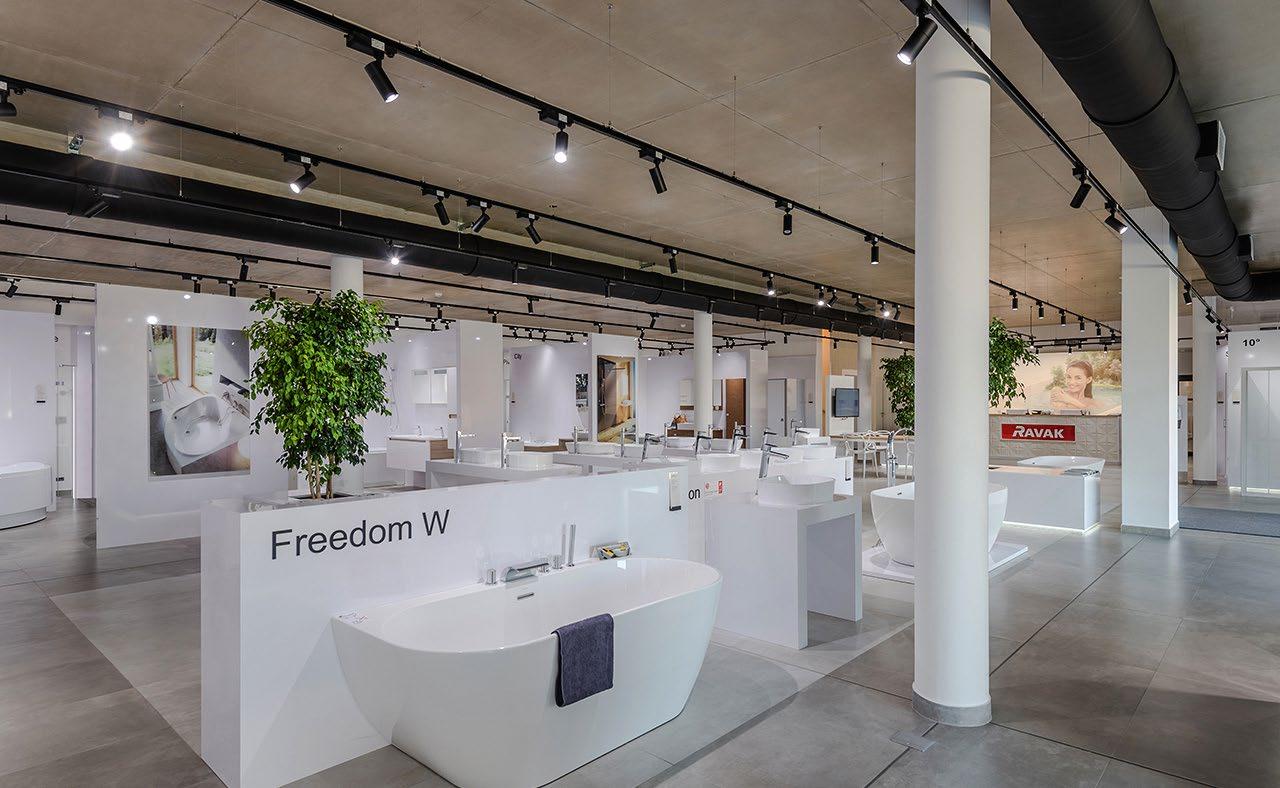
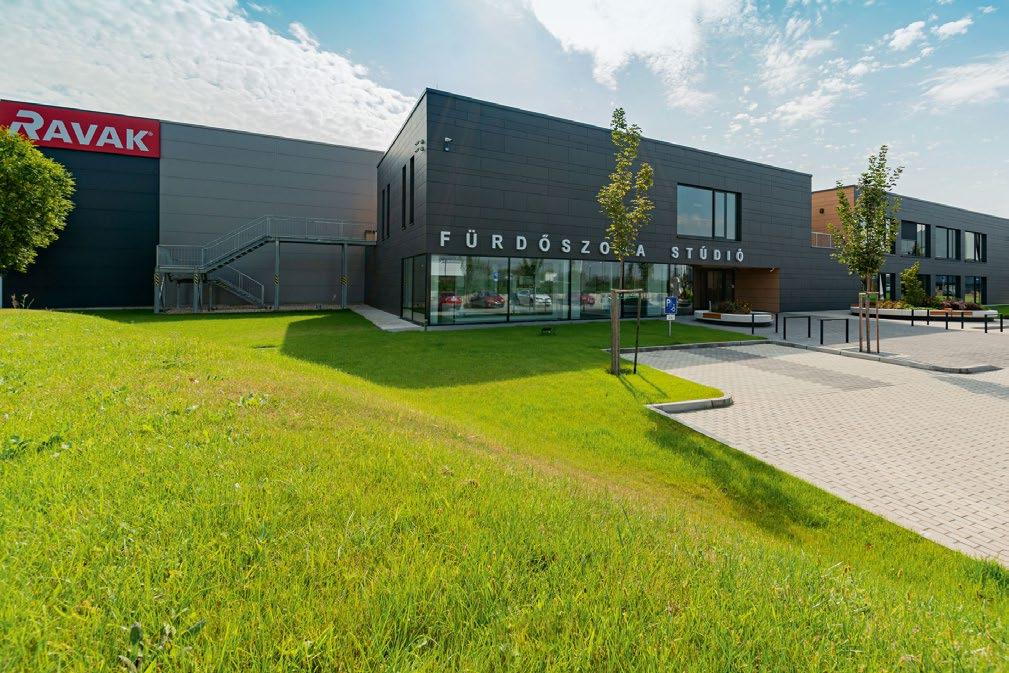
RAVAK has now been around for more than three decades and has managed to build up the largest bathroom furnishing manufacturer in the Czech Republic. István Pintér, Head of Marketing at RAVAK Hungary Ltd. tells Diplomacy&Trade, among other things, about the main milestones in the company's development and expansion and the newly built premises created with sustainability in mind.
the same design. These harmonized conceptual elements create a harmonious whole, a pleasing appearance in the bathroom. We currently have seven such concepts. In addition, we also focus on practicality,” the Head of Marketing points out.
were less skilled in the construction industry. The need for skilled professionals became even more appreciated, as well as the notion of a ‘long-term reliable’ product. This is why we have launched training courses and media campaigns to promote our products and their reliability.”
“Before the break-up of Czechoslovakia, we produced shower enclosures under a French license. After that, it was our own development department that designed the further product lines. In 2001, we started collaborating with industrial designers, and as a result, our designs are recognized with international awards almost every year. In 2008, we started to produce marble molded products in Szeged, SE Hungary and in 2010, we added faucets to our range. In 2012, thanks to acquisitions abroad, we added bathroom sanitary ware and furniture to our offer. Customers can now furnish their bathrooms (except for tiles) with RAVAK products in a uniform design world. RAVAK Hungary continued its dynamic development in district 14 of Budapest, first in a rented building, then from 2006, in an office building and warehouse base built by own investment,” István Pintér highlights.
Last year, the company moved to the newly built premises in Kistarcsa, just outside Budapest, where it also has a warehouse, showroom and training center. As the Head of Marketing explains, “in 2017, it became clear that our Budapest site had ‘outgrown’ its current location, and the space available there limited our further growth. The greenfield investment in Kistarcsa was primarily geared to our logistical objectives. The warehouse, with a height of around 3,600 m² and a warehouse management system, allows the handling of up to six truckloads of goods per day, thus providing a flexible service to our distributors.
Our modern 500 m² expo showroom offers a full range of products and our training room can accommodate up to 30 people for theoretical and practical training. Our aim is to develop the knowledge of interior designers and sales staff and to create a national network of dealers, i.e. intensive practical training for at least 300 fitters.”
The new site was built with sustainability in mind. The company’s aim was to build a ‘smart building’, the details of which were already on the drawing board. The building is equipped with a number of sensors to control light switching, temperature, brightness and air quality without the need for manual intervention. “These are all optimized for the number of staff in the building at any one time. The building is surrounded by a landscaped area, where, in addition to ornamental plants, there are around 110 fruit trees. Living walls and trees in the offices and showrooms create a pleasant atmosphere, which is appreciated by our clients,” István Pintér says.
RAVAK not only sells individual products, but also offers solutions and concepts to its customers. “We currently cooperate with three renowned design studios – STORZ Design from Austria, Krištof Nosál from the Czech Republic and Vrtiška&Žák from the Czech Republic. The design criterion is that the design of the product ranges (bathtub, shower enclosure, shower tray, washbasin, furniture, tap) should be in line with each other, with formal elements that have
As regards feedback from customers and to what extent it is used in the development of products and services, István Pintér stresses that RAVAK Hungary Ltd. uses various software solutions to keep track of market information in addition to sales processes. “During on-site training sessions, we collect feedback from interior designers, distributors and installers, which is evaluated and passed on to the product development department. We collect information from our customers in the form of questionnaires, and we also receive feedback via social media. This information significantly determines our product and service development strategy.”
In recent years, the Hungarian construction industry has undergone a major development. Accordingly, RAVAK has also took up the gauntlet. As the Head of Marketing notes, “the dynamic development of the housing market has naturally increased the interest in our products. A lot of unknown manufacturers' products appeared on the market and several teams of contractors who
In the current economic situation, orders from the construction industry are decreasing, investments such as bathroom modernization are being pushed to the background – circumstances that RAVAK Hungary Ltd. also needs to take into account. As István Pintér describes, “demand-supply factors have also changed a lot in our market in the last year. On the supply side, the extreme rise in raw material prices and energy prices has increased production costs. In our case, the exchange rate of the Hungarian forint against major currencies has also had a negative impact on prices, and we have had to adjust the prices of our products several times. It is inevitable that demand has fallen as a result. In addition, on the demand side, resources also decreased: high interest rates, higher household spending. It is difficult to plan for years ahead. The evolution of the market in the coming period will be determined by inflation and bank lending rates. At the moment, we see the outlook as unfavorable in this respect. Our aim is to maintain our market position, stabilize our production and operating costs and adapt our product range to changing customer needs.”

Continental is a technology company with more than 190,000 employees around the world, develops pioneering technologies and services for sustainable and connected mobility of people and their goods.
Founded in 1871, the company offers safe, efficient, intelligent and affordable solutions for vehicles, machines, traffic and transportation. In Hungary, the company operates six factories, four R&D centers and a tire trading and logistics center. In Hungary, the Continental Group is present in all three business sectors, such as the automotive sector, tires and through ContiTech, a supplier of industrial solutions. Its domestic companies have operations in Budapest, Budaörs, Debrecen, Makó, Nyíregyháza, Szeged, Vác and Veszprém.
At its various locations in Hungary, Continental shapes the mobility of the future as one company. As to how this (and other related issues like autonomous driving) appear in the activities of Continental in this country, the Managing Director of Continental Automotive Hungary, Dr. Róbert Keszte explains to Diplomacy&Trade that “at Continental, we have been developing driver assistance systems worldwide for more than two decades, including various camera systems, radars, lidar, ultrasonic sensors and also developing algorithms to process and interpret the signals from all of these. In Hungary, our Artificial Intelligence Development Center and our Application Development Center newly opened in September 2022, both in Budapest, will play a leading role in the development of self-driving functions.”
Besides tires and industry solutions, the growing path is technology and innovation A company like Continental cannot sustain itself without innovation. Last June, it announced increasing the role of its Hungarian R&D team and rely more on Hungarian brainpower.
“The creation of our Artificial Intelligence Development Center was an important milestone in 2019 for our company on the road to automated driving. This year, we have more than 200 people working in our Budapest center, our team includes deep learning experts, embedded algorithm developers, computer vision software engineers, infrastructure engineers, project managers and data engineers. This year, the center will expand its development team in Szeged and Debrecen. Together with the function development area situated in Veszprém, Continental Hungary has become
one of the most important European players in autonomous and safe mobility. Our colleagues will be working on the highly safe and affordable driver assistance and automated driving solutions that Continental's partners around the world can use,” the Managing Director highlights. Last year, Continental redesigned its test track in Veszprém to help engineers test and further develop electronically controlled brake systems and their components.

“In addition to production and development, our engineers in Veszprém check vehicle dynamics developments in a real environment on our own test track, which is suitable for braking and vehicle dynamics tests related to highly automated and safety-related functions. The test track provides five modules to meet the testing needs, namely the dynamic surface, the handling track, the braking surface, the hill climbing and hill descent module with different gradients, and the inclined acceleration lane,” he explains. Continental’s development center in Veszprém is the full project manager for ESC systems, including the coordination of other locations worldwide, such as the Frankfurt center, which allows Continental to serve some of its customers all over the world entirely from Veszprém. In addition, its sensor development department is a center of competence worldwide for a wide range of sensor systems.
Continental has been a pioneer in road safety for more than 150 years, and now the company is taking this expectation to an even higher level with the Vision Zero concept. It succinctly summarizes the strategy from achieving the best braking performance through assisted driving
solutions to zero fatalities, zero personal injuries and zero accidents. The Managing Director points out that their solutions are designed to recognize complex traffic situations and help avoid fatal road accidents. “In this way, the Application Development Center and the Artificial Intelligence Development Center in Budapest contribute to Continental's Vision Zero ambition to radically reduce the number of fatalities on our roads every day.”
Continental is one of the world's largest automotive suppliers. However, no matter the size, it has also been affected by the pandemic and the resulting supply chain breaks. As Dr. Róbert Keszte stresses, Continental's Hungarian plants – with two exceptions – are highly dependent on global automotive market trends, and thus, the company cannot escape the declining production figures of the automotive industry. “All six of our plants in Hungary were under pressure when the new coronavirus emerged in 2020, and we were only able to increase our sales slightly in 2021.
If the fourth quarter of this year develops in line with our optimistic demand expectations, we will be able to reach pre-pandemic sales levels in Hungary, despite the fact that global automotive production has not yet caught up,” he says.
Continental’s corporate social responsibility policy is in line with the company’s ultimate goal: safety on the road. The Managing Director underlines that “one of the most important components of our corporate social responsibility is that we want to make transport accident-free. In addition, sustainability in our development and manufacturing processes is essential. By 2050,
Continental's value chain must be designed around responsible sourcing and business partnerships. For the company, responsibility along the value chain means that all partners create ecological, economic and social value for society, and our environmental strategy's main ambition is to make the company's activities sustainable at all levels of the value chain. We have already received a lot of feedback on our value creation activities, with our Veszprém site being named Supplier of the Year in 2021 and our Budapest unit winning the Factory of the Year award in 2020. Our Budapest factory also received the Factory of the Year 2020 Energy Efficiency Award, as well as the CSR Hungary Award 2021, the CSR Hungary Europa Design Award and the Open Minded Company Award 2021.”
Continental has implemented several investments in Hungary in the past couple of years. When asked to describe how those fit in with the company's development in this country and what the plans are for the years to come, Dr. Róbert Keszte highlights that “those working with us can really make an impact on mobility, and with our developments, we can prevent road accidents and make the movement of goods and materials more economical and more sustainable. In recent years, there have been a number of investments in our factories and development centers in Hungary that make Continental a visionary and sustainable company in Hungary. Full-scale digitalization is an expensive and slow payback process, but it is necessary. Without it, our organizations and processes will not be able to work together after a while, so it is definitely worth investing in.”


The first ever Prime Minister of color in the United Kingdom has assumed responsibilities of almost historic proportions in various senses. In place of the generally upbeat first speech in front of 10 Downing Street was everything but. Rishi Sunak warned of ’difficult’ decisions to deal with the ’profound economic crisis facing Britain’. And that is only one of the outstanding issues that are waiting for the new resident of one of the most famous addresses in the world in the ’in-box’. The unresolved questions between the EU and the UK, the perennial Scottish attempts at gaining independence, the future of Northern Ireland, the ongoing Russian-Ukrainian war and its far-reaching security and energy implications are a few among the weightier problems.
Rishi Sunak is not only the Prime Minister of the UK, but he is also the leader of the Conservative Party, which – for all intents and purposes – is undergoing in one of its worst identity crises in its century-long history. The Labour Party is ahead of the Tories in the opinion polls by some 35 points, and it will be a tall order for Mr Sunak and his party to close the gap between now and 2024 when the next parliamentary elections are to be held – provided, the government does not collapse meanwhile. It is true that the Conservative Party has a comfortable parliamentary majority with 357 seats out of a total of 650; however, as the fall of Boris Johnson and Liz Truss in the past few months demonstrated, the Tories are deeply divided in a number of issues from the economic policies to
taxation and social services. The Conservatives have been able to manage the recent changes in the leadership, but it seems more likely than not that they cannot afford another leadership failure. In case of another one in the near future, the pressure would be too strong to call an early election; in fact, even now Rishi Sunak is confronted with claims that he does not possess a democratic legitimacy. Boris Johnson won the general elections straight in 2019 with a popular mandate; Liz Truss gained the premiership after an internal voting by some 160,000 Conservative Party members, while Rishi Sunak became Prime Minister with the support of 178 Tory MPs – hardly a popular mandate. According to opinion polls, some twothirds of the British voters favor early elections. Nevertheless, in general, all opinion polls should be taken with a grain of salt. As for the British ones, they were wrong in a number of elections and the Brexit referendum alike in the recent past.
While the election of Liz Truss met with distrust in the business community, Rishi Sunak seems to be a safe pair of hands. After graduation, his first work place was the investment bank Goldman Sachs, then he was working for two large hedge funds before entering politics. He has had a meteoric rise: was elected an MP in 2015 and five years later, he got the unofficial No. 2 position in the government as Chancellor of the Exchequer. He was the one who opened the gates of the resignations of the 50 or so members of the government earlier this year in response to the antics of Prime Minister Boris Johnson. He was defeated in the ensuing leadership contest in August, but the ’unforced errors’ of Liz Truss and her Chancellor, Kwasi Kwarteng forced the
Prime Minister first to fire Mr Kwarteng, then a few days later she had to resign. Rishi Sunak was lying low during the 44-day long Truss premiership, and he became an obvious choice as the early return of Boris Johnson into power was a no-starter politically – despite the fact, that ’BoJo’ is still the most popular Conservative politician in the country. Mr Sunak has an image problem: he and his wife are among the richest couples in the U.K., Rishi Sunak himself was having a U.S. green card for some time, and his wife, Akshata Murthy was a ’non-domicile’, that is, she was paying taxes outside of the United Kingdom. Rishi Sunak’s detractors and political opponents (there is quite an overlap) are doing their best to depict the new Prime Minister as a person out of touch with the problems of the large majority of the British people, which incorporate, among others, high energy prices, high cost-of-living, some seven million people on the waiting lists of the NHS, and so on.
Prime Minister Sunak has promised to correct some of the mistakes that his predecessor committed. First and foremost, Liz Truss wished to follow Margaret Thatcher’s neo-liberal economic policies with low taxes, deregulation and the like (’Trussonomics’). However, times have changed – and Liz Truss is not Margaret Thatcher – and her proposed mini-budget would have had GBP tens of billions of unfounded programs as the idea of recharging the economy by slashing personal income taxes was an economic ’fairy tale’ as Rishi Sunak pointed out in one of the debates between Liz Truss and him in August. Rishi Sunak has not committed another
mistake done by his predecessor either. Liz Truss picked the cabinet members only from among the ’hard-core’ conservatives and Brexiteers (Kwasi Kwarteng, Suella Braverman, Jacob Rees-Mogg, among others), while Rishi Sunak has appointed cabinet members who represent the various factions within the party (for instance, Jeremy Hunt or Dominic Raab while retaining a number of cabinet members too, including Ben Wallace, Suella Braverman, James Cleverly, and so on). However, it remains a ’million-dollar question’ whether the rather unruly Conservative Party can be united, and if yes, how the traditional Tory voters and the Brexiteer working-class ones in the previously Labour constituencies in the Midlands and the industrial centers can be persuaded to vote for the Conservative Party when the parliamentary elections come, most likely late 2024. If Rishi Sunak is not able to square this circle, then the Conservative Party is bound to suffer a defeat of the proportions of 1997. True, the Tory wipeout at that time needed a Tony Blair and an invigorated Labour Party, which had been out of power for 18 years. The Labour will have been out of power for 14 years by 2024, but Keir Starmer is not a Tony Blair, and the party has had to pay a stiff price for taking a sharp left turn after 2010 in contrast to the party in the 1990s when Tony Blair steered it back to the center. Despite the obvious weaknesses of the Tories and the opinion polls, the Labour does not seem to be able to offer an attractive alternative now. The Labour Party also has its own unresolved squares to be circled. Whichever party is able to do the trick will have better chances at the next parliamentary election.
 Tamás Magyarics is a foreign policy analyst
Tamás Magyarics is a foreign policy analyst

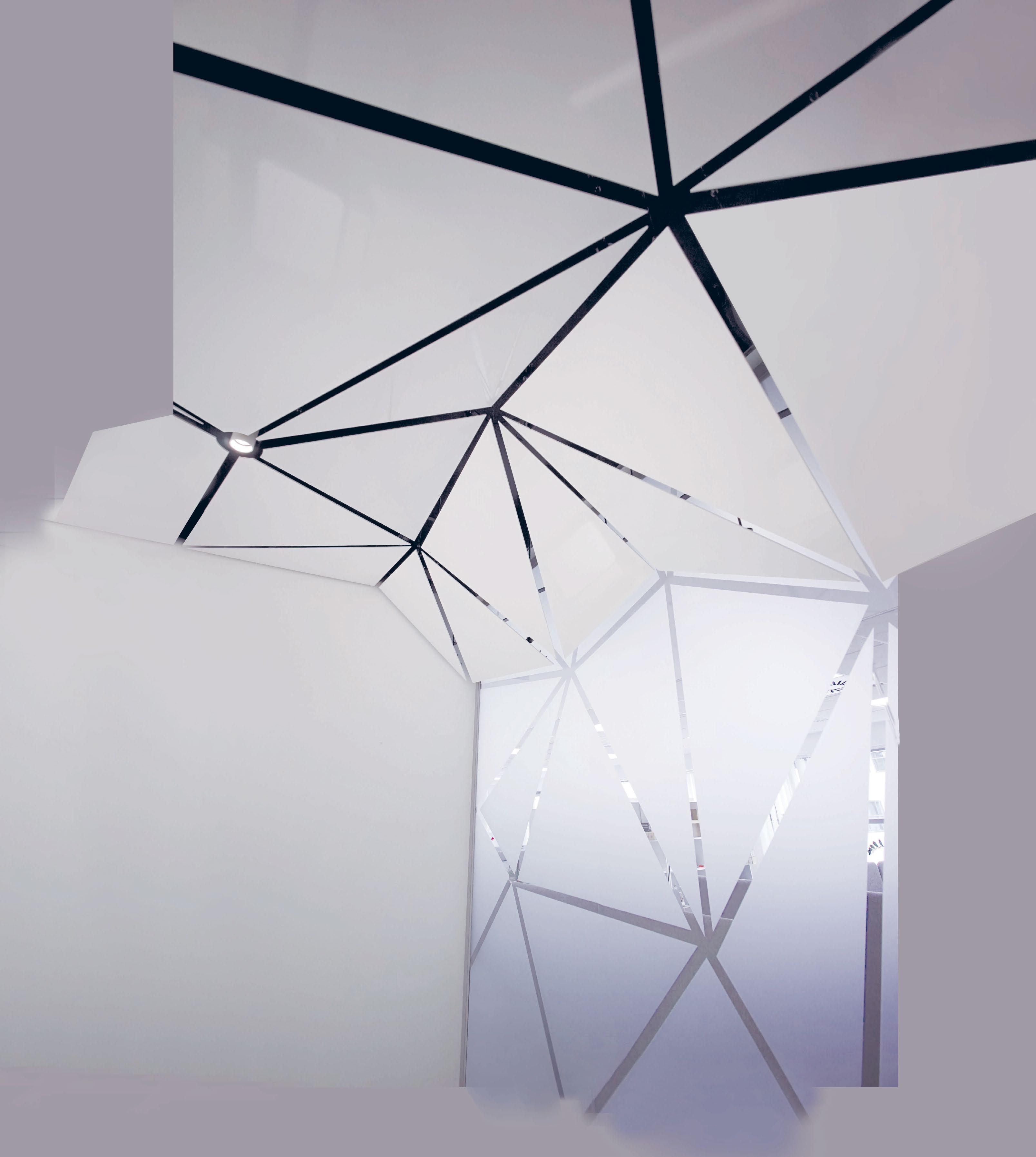
HUNGARY BRANCH OFFICE Architecture / Engineering / Construction
www.takenaka.eu info@takenaka.hu

Diplomacy&Trade’s The Club welcomed guests on November 7 at the Kempinski Hotel Corvinus in Budapest after a nearly two-year hiatus caused by the pandemic. The event marked the 12th anniversary of The Club, an evening of discussion and networking for diplomats and business people. Diplomacy&Trade publisher Peter Freed greeted guests and introduced the key speaker of the evening, Ambassador Tamás Magyarics, university lecturer and one of Hungary’s foremost experts on US history, foreign policy and politics. The main focus of The Club couldn't have been more topical: it was the night before the US midterm elections, an event closely followed by millions in and outside America. Peter Freed emphasized the importance of the outcome of vote for Americans and for many beyond the US borders, remarking that the ballot would shape US domestic and foreign policy for years to come.




Following welcoming remarks from Area General Manager of the Kempinski Hotel Corvinus Budapest, Stephan Interthal, freshly back from New York where elections were the talk of the town, Tamás Magyarics took the stage and shared his thoughts on the outlook for the elections and the issues that hanged in the balance. Hungary’s former ambassador to Ireland, Magyarics is a widely acknowledged expert in the fields of the history of US-Central European relations in the 20th century; the history of the U.S., with an emphasis on foreign affairs; transatlantic relations; and the theory of international relations. Ambassador Magyarics stressed that the complexity of domestic and international issues preoccupying US voters (inflation, abortion rights, immigration, the war in Ukraine) made it very hard to predict which way voters will cast their ballots. He noted that the election campaigns were digging trenches even deeper in the highly polarized American society and remarked that US foreign policy and transatlantic relations were unlikely to undergo a sharp change even in the event of a decisive win of the Republican Party. Following the discussion and Q&A session, the hotel hosted a reception with a gastronomy selection and wines from the Kovács Nimród Winery.

During my country’s history as an independent nation – and especially during the first half of the 20th century –, thousands of multifaceted and hard-working people emigrated to the long and narrow land, washed by the waters of the Pacific Ocean, that we call Chile. Among them, a small but talented group of Hungarian artists, bound to become extremely influential members of our national artistic scene and society.
Looking for a second chance in life
They included dancers, architects, sculptors, but especially painters, who landed in South America at different times escaping from war or authoritarian regimes. They were searching for a second chance in life in a faraway land that welcomed them and where they finally left a long-lasting legacy as well as descendants that now form an integral part of Chilean society. At the end of the 19th Century and beginning of the 20th, Hungary, and specifically Budapest, was already a dynamic and vivacious meeting point for artists and artisans motivated by an environment that favored their restless and creatives minds and souls. Such was the case of Ernest Wünsch, Pál Vidor, László Cseney, Rudolf Pintye, József Menich, Lajos Jánosa and the siblings Laura and Iván von Liftner. Most of them, former students of Budapest’s Royal Academy of Fine Arts.
All of them left and invaluable heritage in Chile, were awarded numerous prizes and recognitions and were vital in the education of generations of Chilean artists who followed their footsteps. As soon as they arrived in Chile, they blended perfectly with the local artistic community, connecting with the postimpressionist collective called the Group of Montparnasse as well as Generation of 1913, a cluster of painters educated under the guidance of the Spanish Master Fernando Álvarez de Sotomayor. The strong and lively colors of their work, done with spatulated and stern strokes, immortalizes scenes from the Chilean countryside, as well as the indigenous and creole culture – a style that merged perfectly with the emerging rupturist movement as opposed to the classic academicism of the early 20th Century.

Due to the constraints in the length of this article, I will only refer to the first three of the abovementioned painters, starting with Master Pál (Pablo) Vidor (1892-1991). Born in Budapest in 1892, he studied in the Hungarian Academy of Fine Arts and served during the First World War, where he was wounded on the battlefront. Having studied under the guidance of Master Ede Balló, Vidor was already a stablished

artist before migrating to Chile in 1924. Owner of a modern style of painting, he adapted perfectly well in the local scene and only four years after his arrival (1928), he was hired as a Professor at the Fine Arts Academy of Santiago. Two years later, he was named Director of National Museum of Fine Arts, a post he would occupy until 1933. Winner of several prizes, Vidor left a heritage of around 130 oil and watercolor painting as well as lithographies depicting landscapes, dead nature and portraits.
Another of the most renowned Hungarian artists that migrated to Chile, this time a sculptor, was Ernst (Ernesto) Wünsch (1885-1969). Also born in Budapest, he was the son of a German engineer called Robert Wünsch, who worked in the construction of the city’s subway line, the first in continental Europe. He arrived in Chile in 1920 and although little is known about his academic background, some biographers have stated that he had even studied under the guidance of Auguste Rodin in Paris. Just like Vidor, he became well known within the artistic community soon after his arrival. As a result, he caught the eye of the Chilean aristocracy which would order from him several sculptures, mainly to be placed in family mausoleums. But unlike that of other artists whose work
can only be appreciated in museums or private collections, the legacy of Wünsch lives in the streets of Santiago decorating the façade of famous buildings such as the Bank of Chile, the South American Insurance Company and, most famously, the huge Christ that decorates the Catholic University in the capital’s main avenue, the Alameda.
Finally, I should mention László Cseney (1905-1983) who later became known in Chile as Ladislao Cheney. Born in the town of Salgótarján from a family of Croatian origin, he was educated in the Academy of Fine Arts of Budapest and continuing his training as a painter within the famous artistic community of Nagybánya. He arrived in Chile in 1930, with his wife, Rosa Cheh Kontha, and they settled in the city of Valparaiso where they wwould reside for the rest of their lives. He was welcomed by the small but well-established community of Hungarian artists including Pál Vidor and another alumnus of the Fine Arts Academy of Budapest, Rudolf Pintye. Besides his notorious artistic skills, the work of Cseney is remembered as a graphic testimony of the essence of Chilean life during the 20th Century. The farmers in the countryside, the Mapuche people, fishermen of the vast Pacific coastline as well as portraits of several notorious characters of society, were often the themes of his paintings.
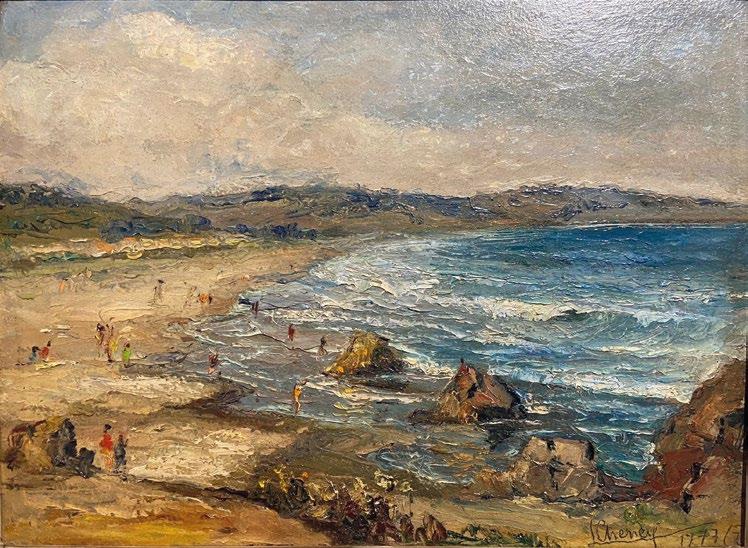
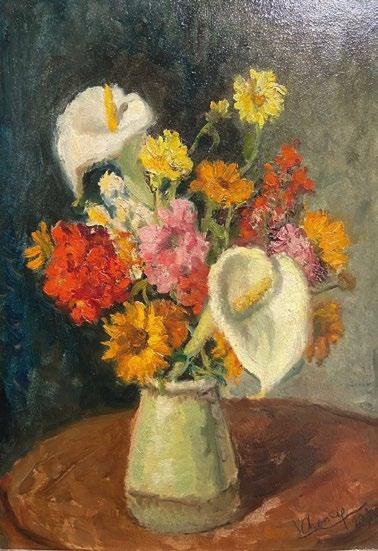
While walking the streets of the beautiful Hungarian capital, traversed by the winding and blue Danube, I come across numerous galleries, art dealers, antic shops and auction houses. They offer everything from pieces of attractive prices until those that can reach record prices in the international art market. It is a testimony of the impressive array of artistic capacity, sensitivity and skill of the Hungarian people. A talent so strong that it even left its mark on the other side of the world, a long narrow land called Chile.

The Kempinski Hotel Corvinus Budapest has appointed Ádám Lévay, a professional with extensive international experience, as the hotel's new Executive Chef. According to the hotel, “mastering his profession, stewardship and management at several iconic hotels around the world, Ádám brings a powerful combination of craft and insight to Kempinski Corvinus.”
Ádám Lévay started his career in Budapest, worked in various parts of the world and then returned to the Hungarian capital last year. Summarizing the experience that he brought home with himself, he says that “in Budapest, the culinary level is quite high right now. The most interesting things that I could bring home are the cooking techniques, the spices and the flavors and different ingredients that people use around the world but are not really known and used in Hungarian cuisine like different kinds of spices, herbs and cheeses from the Middle East. That's basically what I try to somehow build into the cuisine here and in the menus that we are creating now,” he tells Diplomacy&Trade.
As for the managerial part of the job, the chef is of the view that Hungary is very different from a lot of countries in the world. “Here, we try to ‘grow’ people in the kitchen as managers.
I think it's very important in Hungarian hotels and kitchens to start to teach people how to lead and manage. Most of the time, people tend to think the chef is cooking in the kitchen all day. However, it's very important to understand that the chef is a manager at the end of the day, and on the way until you establish yourself as an executive chef, you need to learn how to deal with people, how to manage people, and basically how to organize your kitchen. It is the same as any other department, but in this case, they sometimes focus more on the culinary background and not really on the management skills.”
As to how he would define Hungarian cuisine having visited so many places around the world, Ádám Lévay says Hungarian cuisine is very flavorful. “I think we should be prouder of it. In every other country I went and I worked in, people are really proud of their kitchen. They are very happy to show you what they're eating, how they cook. I think in Hungary, sometimes we are not really proud of what we have. We always try to make it a little bit more complicated, a little bit more ‘wow’. Sometimes less is more and sometimes the simplicity and the history of the dishes make them interesting enough to show to foreigners. Wherever I went in the world, I always tried to show a little bit of the Hungarian cuisine, of course. Sometimes, it was very challenging because we use a lot of pork, and it is not available everywhere, especially in the Middle East. Naturally, when ingredients are replaced, the dishes are completely different. Hungarian food is very much liked in the Middle East as the way it is cooked is very similar to how they cook, it's also very
juicy and flavorful, similarly to local dishes.” He believes Hungarian food should be made a bit more up to date, a bit easier to digest for foreigners. “But I also think it's very important to keep the dishes as they are because that is what makes them authentic.”
Ádám Lévay has sharp focus on the complex aspects of the food-and-beverage area that encompasses all aspects, from kitchen management to the ultimate culinary customer experience. He stresses that the process starts with a lot of research. “It's very hard to find a good, reliable supplier who is able to supply you with the quantity you need. I think smaller restaurants have an advantage as they don't need such huge amounts like we do here at the hotel. It is a challenge for us to find the right supplier. That is why research is very important, but it takes a lot of time. Of course, whenever we find a good product, we check the quality, use it, sometimes putting it on the seasonal
menu. If the guests like it and we are happy with the product, then, we put it on the menus and even offer it on the banquet menu. Actually, we have quite a fine banquet operation here.”
In line with the concept of the place
Regarding how that fits in with Kempinski Hotel Corvinus Budapest’s commitment to seamlessly executed, high-quality and marketfirst gastronomic initiatives, the hotel’s new Executive Chef explains that “it fits in very well. ‘ÉS Bisztró’ in the hotel is a very well-known and popular place. It's very important to keep the concept of the place, we don't want to go in the fine-dining direction. But it's very important to enhance the products what we offer to the guests. For example, fried chicken is a very basic dish but it really matters what kind of chicken you're using, how you prepare this dish, how you take care of the chicken until it is put on the table. This is what we try to focus on right now.”
Ádám Lévay has been quoted as saying that his passion comes from “using healthy and fresh ingredients in a way that is the most appropriate in their combination and interaction, to achieve pure perfection.” In explanation, he highlights that “sometimes if you have a good ingredient you don't need to do too much with it. Sometimes, chefs make a mistake by using too much spice, they overwhelm the flavor, overdo the dish. I like to keep it simple. When you create a dish, sometimes it's very difficult for a chef to stop. You always try to add more and more things, and then, at the end, you just have too much and you don't understand the dish anymore. Sometimes, you need to know when you need
to stop. There is this saying that ‘sometimes, less is more’ – I completely agree with that.”
When asked about his favorite ingredient and favorite dish, the Executive Chef says he loves tomatoes. “Any kind of tomatoes, fresh, raw, marinated, cooked, baked, whatever. I eat a lot of tomatoes. Basically, I cannot really eat without having tomato. I love it. It's a beautiful vegetable. In the kitchen, you don't have too much time to cook and sit down and eat properly. Whenever we create a little meal with the guys, then pasta is the perfect solution. I can eat pasta anytime, anywhere, seven days a week. I love that too. I think it's a very simple meal, but it is very difficult to do it right. I've worked with a lot of Italian chefs and they are super proud of, and super detailed on, proper pasta. It's very, very difficult to execute the process in a proper way so as to have the proper crunchiness, to use the right salt, the right flour in the pasta and then, you use the right tomatoes – following the process until the end.”

As Executive Chef at Kempinski Hotel Corvinus Budapest, Ádám Lévay highlights that his job does not only include the creation of culinary delights for present and future customers but also the management of financial issues. “At the end of the day, the hotel is a business, so it's very important to make money and keep that money. But of course, whenever you come to the restaurant, we try to give you the best what is available, whatever we can source. That's what is in our focus now: enhance the product, enhance the quality and the consistency of the food and the dishes in our outlets and restaurants.”

APRIL 23, 2023 MVM
Roger Waters' This Is Not A Drill tour will be featured in Europe in the spring and summer of 2023. The 40-stop concert tour will start in Lisbon on March 17 and will visit 14 countries, including Hungary.
The concert will feature 20 songs from Pink Floyd and Roger Waters classics including Us & Them, Comfortably Numb, Wish You Were Here and Is This The Life We Really Want?, as well as the debut of Roger Waters' brand new composition The Bar.
In addition to vocals, Roger Waters will play the guitar, bass and piano. He will be joined by Jonathan Wilson and Dave Kilminster on guitars, Jon Carin on guitar and keyboards, Gus Seyffer on bass; Robert Walter on keyboards, Joey Waronker on drums; as well as vocalists Shanay Johnson and Amanda Belair and saxophonist Seamus Blake.
"This Is Not A Drill is a revolutionary, extravagant rock and roll and cinematic experience performed on a stage in the middle of the room, and a stunning indictment of the corporate dystopia in which we all struggle to survive. It calls for action to love, protect and share our precious and unbalanced home on this planet. The show includes dozens of songs from Pink Floyd's golden era, along with many newer songs, with the same lyricist and composer, the same heart, the same soul, the same man. This could be the last hurrah. Wow! My first farewell tour! Don't miss it". With love, R." livenation.hu
MARCH 14, 2023 BUDAPEST SPORTS ARENA Robbie Williams has announced new European dates for his ‘XXV’ tour. Bringing his high-octane shows to cities across Europe, the new 2023 tour dates kick off with a show in Bologna, Italy on January 20 before taking in cities across the continent including Paris, Amsterdam, Berlin, Barcelona – and Budapest!
The arena tour will be a joyous celebration of Robbie’s 25 years as a solo artist following the release earlier this month of his album, ‘XXV’, which features many of his greatest hits and fan favorites from across his solo career, according to livenation.hu

Just recently, Robbie secured his 14th UK Number 1 album with ‘XXV’, which topped the chart in its first week of release. With this amazing achievement, the music icon has broken his record for the solo artist with the most UK Number 1 albums. It places him in the top two acts of all time with the most Number 1s across their catalogue with only Paul McCartney with more. livenation.hu
From the very beginning, Müpa Budapest has made it its mission to provide an insight into the hitherto hidden or less spotlighted values of classical and contemporary music through concerts by the country's leading symphony orchestras, while at the same time drawing attention to the great musicians of the future. The 2022/23 edition of the Discoveries concert series will feature the Szeged, MÁV and Miskolc Symphony Orchestras, the Győr Philharmonic Orchestra and other earlycareer Hungarian and foreign talents of particular interest, while the program will also include rarely heard delicacies and a premiere, alongside the unmissable and much-loved works of music history.
The Szeged Symphony Orchestra's concert will feature a rarely heard literary gem, the overture to Robert Schumann's oratorio composition Scenes from Goethe's Faust.
Also a Schumann work, the Piano Concerto in A minor, and Dvořák's hugely popular Cello Concerto will provide a great opportunity for the debut of the 27-year-old Hungarian pianist Gergely Kovács and the South Korean cellist Jeongheon Nam. The conductor of the most important music ensemble of the Southern Great Plain in Hungary will be Sándor Gyüdi, who has been the artistic director of the orchestra for almost two and a half decades. mupa.hu
DECEMBER 06 - JANUARY 15, 2023, MILLENÁRIS BUDAPEST, BUILDING ‘D’
Since its première in 2018, Recirquel's winter contemporary circus fairy tale, Kristály [‘Crystal’], has been a permanent fixture on the December program calendar for children. Young and old, children and adults alike were immediately enchanted by the heart-warming story. The production combining elements of dance and circus has been hosted by Müpa Budapest more than a hundred times in the colorful circus tent erected beside the building. This season, however, the magical world of Kristály will move to a new venue, the Millenáris Glass Hall. Thanks to the significantly larger performance space, the production will feature new set and visual elements, giving even those who have already seen Kristály a new experience.
The production, dreamt up for the stage by artistic director Bence Vági, evokes the atmosphere of classical fairy tales using elements of dance and circus, whisking the audience to the frozen lands of Snowlandia, where laughter and good cheer are prohibited. Along with the audience, the cast search together for the warmth of love and hope of light that permeates everything, and with which they can melt the frosty heart of mistress Kristály and save the inhabitants of the kingdom. The special performance area allows the sparkling frozen fairy tale to come to life before the audience's eyes. As soon as you step into this illusion-filled and snowbound space, you too become active participants and almost breathe as one with the performers as you follow their every move as they swoop over your head at arm's length. mupa.hu

The fantastic, glittering world of revue has returned to the stage of Matild Café & Cabaret. Three evenings a week – Thursday, Friday and Saturday night – the early twentieth century Pest nightlife is revived with live performances featuring Hungarian and international entertainers, never-before-seen night shows and a three-course dinner.
“We already knew when we renovated the palace and chose the name that we would present the most glamorous, yet most elegant night performances in Budapest,” Selim Ölmez, General Manager of Matild Palace, a Luxury Collection Hotel, Budapest says.

The Matild Café & Cabaret is an elegant and traditional Art Nouveau coffee house shining in olive-green and gold during the day, but when the night falls it transforms into a place where glamorous and vibrant night life returns within the walls, according to the hotel.

The owners of the Palace wanted this more than a century-old café to transform for the night because of the spirit of the place, as when it operated as the ’Belvárosi Kávéház’ [‘Downtown Café House’] or later the ’Lidó Kaszinó’ [‘Lido Casino’], similar shows were offered to the audience. When the renovation took place and the hydraulic center stage was discovered, there was no question of renovating it and continuing the tradition. In the evenings, the stage rises so that the dancers and musicians can enchant the audience. When the heavy velvet curtains are closed, the atmosphere becomes mysterious, discreet and even a little provocative. The lighting was also designed from the very beginning to enhance this effect, so this way the glamour, the sensuality, the easiness, and the free-spirited fun can return between the walls. A venue with a completely different atmosphere comes to life.
Matild Café & Cabaret will rewrite history every Thursday, Friday and Saturday night. Gigi Radics, Bálint Gájer, No Romance, Latte Maffiato, Group’n’Swing are just some of the acts who will entertain during the musical dinner parties, followed by glamorous revue dance shows to top off the night. Doors open at 8 PM with a magical acrobat show, then an exclusive 3-course dinner is served, while wonderful live concerts and dance performances alternate. The gastronomic offerings of the night are prepared by the local team of the AmericanAustrian star chef Wolfgang Puck, in the usual quality of the Matild Palace. And for those who wish to continue the night after the show, exceptional cocktails and the most beautiful panorama of the city awaits on top of the Palace, at The Duchess, a secret liqueur library.
“The goal was to bring the perfect fusion of culinary heaven and earthly delights to Budapest. At Matild Palace, we never give less than the best. These will be the most glamorous, yet most elegant night performances of Budapest. The venue will once again become the classy, sophisticated and sparkling entertainment center of the city,” the General Manager of Matild Palace promises.
GROW du Monde, an international wine competition specializing in Olaszrizling (a.k.a. ’Welschriesling’ or ’Graševina’) type wines, was held for the first time this summer, with a wine from Eger among the winners.



At the contest held in Petrovaradin, northern Serbia, Hungarian participants won a champion award and a platinum medal. Furthermore, three gold medals, four silver medals and nine bronze medals were awarded to Hungarian wines. Experience gained at the first GROW du Monde are still being reflected upon, but the follow-up events are already being organized, with Croatia hosting GROW du Monde in 2023 and Hungary in 2024.
At the first GROW du Monde, 164 wines from seven countries were judged by an international jury, consisting of wine experts, wine writers and winemakers from the region, as well as a Swiss Master of Wine. From Hungary, Zoltán Győrffy and Dániel Ercsey participated as judges. There were, of course, Serbian, Croatian and Slovenian judges, but the number of judges from a single country were maximized at three.
In the 2021 Fresh Olaszrizling category, the champion prize went to Hungary, with Zelna Winery’s Balaton Olaszrizling 2021 earning this title (the same wine has recently won a platinum medal at the DWWA competition, so it seems that its success is by no means a fluke). Serbia and Croatia won two champion prizes each: the Serbians triumphed in the orange wine category (Vinčić Grašac Amfora 2017) and the sparkling wine category (Vinarija VINUM Dina Brut 2018), while the Croatians won in the Aged Olaszrizling category (Vinarija Krauthaker’s Mitrovac Graševina 2016) and in the Sweet Olaszrizlings (Vina Papak’s Graševina TBA 2015).
Another Hungarian winner in the Fresh Olaszrizling category was Bujdosó Winery's Balatonbor, which won a gold medal. Silver and bronze medals went to Pannonhalma, the Balaton Uplands, the Balatonfüred-Csopak wine region, Villány and Eger. In the Aged Olaszrizling category, the top honors went to Bussay Kövecs Olaszrizling and Zsolt Söptei's Varázslat. In addition, Balaton Uplands, Pécs, Balatonfüred-Csopak and Badacsony also won medals in this category, while in the orange wine category, Somló won several medals.
